Text




me and gang
#gerard way#helena mcr#life on the murder scene#mcr#mcr gerard#mcr tumblr#my chemical fucking romance#my chemical gee#my chemical gerard#my chemical romance#my chem gerard#my chemical frank#my chemical mikey#my chemical ray#my chem romance#mcrmy#mcr memes#gee way#mikey way#ray toro#frank iero#bob bryar#three cheers 20th anniversary#three cheers era#three cheers for sweet revenge#the black parade is dead#welcome to the black parade#the black parade#mcr5#mcr the black parade
118 notes
·
View notes
Text


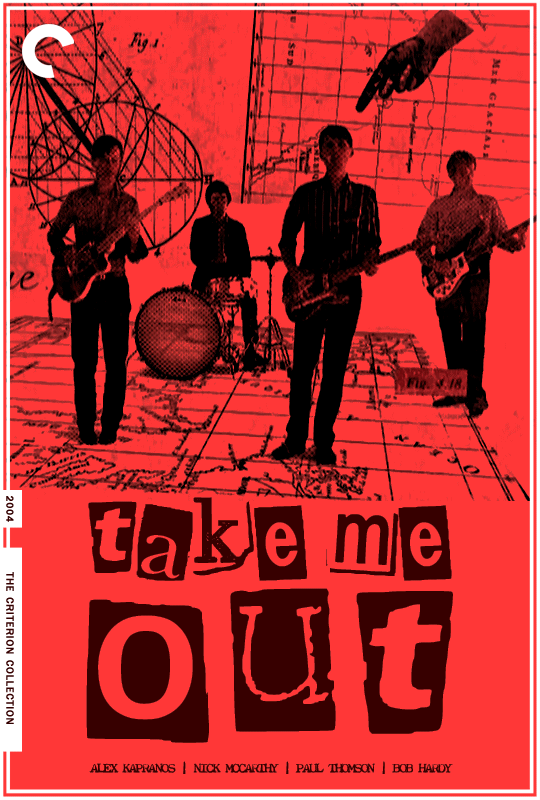





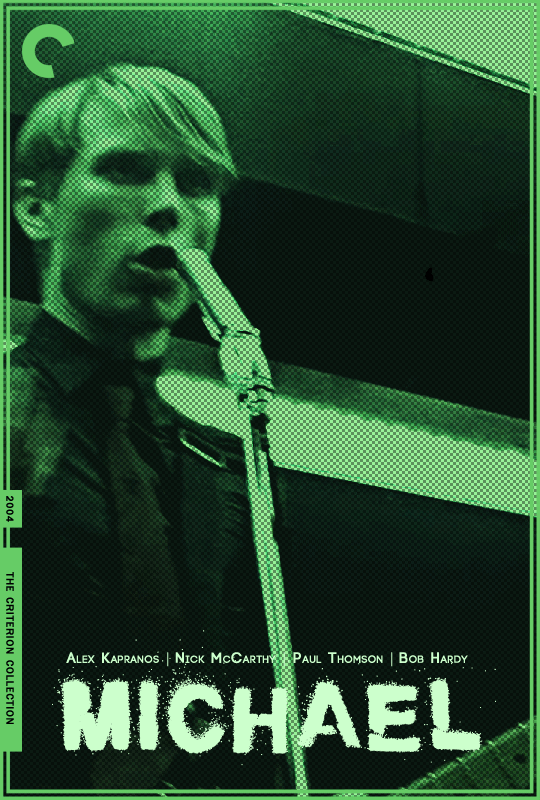



Franz Ferdinand Criterion Collection: The 'Franz Ferdinand' Era
#franzferdinandedit#userrobin#franz ferdinand#alex kapranos#bob hardy#paul thomson#nick mccarthy#my edit#Happy 20th anniversary to self titled <3#also i know that love and destroy is a b side but i needed 12 and it's my favorite of that era's B-sides so
181 notes
·
View notes
Text

Happy 20 years to not only one of my friends 3D & Pixar films but also one of my favourite superhero films of all time! The Incredibles! The story of a superhero family who’ve been suppressed by societal norms and values to hide their superpower identities and live as normal people but that all changed when they had to deal with a former fan turned villain! It’s a movie that showcases many themes such as superheroes in a human society, the term “never meet your heroes”, suppression of what makes one oneself, extermination of many supers, and long lasting consequences. Absolutely fantastic movie and recommend that you watch it! :)
Happy 20th Anniversary The Incredibles!
#the incredibles#the Incredibles 20th#the incredibles fanart#bob parr#helen parr#violet parr#dash parr#jack jack parr#the Incredibles 20th anniversary
4 notes
·
View notes
Text
The soundtrack of this scene remind me of that one from Sponge Bob so I did it lol
5 notes
·
View notes
Text
This book, along with the one I'm now reading, was read purely for laughs.
Now this one, like the one I've started, is just for the laughs and this is one of those understated elements of historical reading. Remembering the bad prophecies (oh hello there, Norman Angell) and how people presented a disaster as going wonderfully well in its beginning can serve as an instructive lesson in how not to be snookered by the next version of this same con.
I will be crude enough to refer to this book as 'The Iraq War told by a US version of Baghdad Bob' and note that this is exactly what you'd get. Zero self-reflection, zero questioning or noting obvious points, zero awareness that the war was not in fact over 90 days from the fall of Tikrit, zero awareness that it only takes one side to continue a war and that even when the insurgency was starting and Iraq collapsed that the US government was deluding itself otherwise.
For laughs, 10/10.
For factual accuracy 2/10.
#lightdancer comments on history#book reviews#iraq war#reading these because of the 20th anniversary of the war for lulz and yuks#and this book did not disappoint#if you want to understand how the US took a failing state and kicked it into an abyss of its own making and then got yeeted like Gandalf#this is exactly how that happened and why#zero self reflection self awareness or understanding that the Iraqis were not consulted on the war being over#if you want to know how an American Baghdad Bob would sound#read this book and you'll find out
0 notes
Text
The Oral History of Take This To Your Grave – transcription under the cut
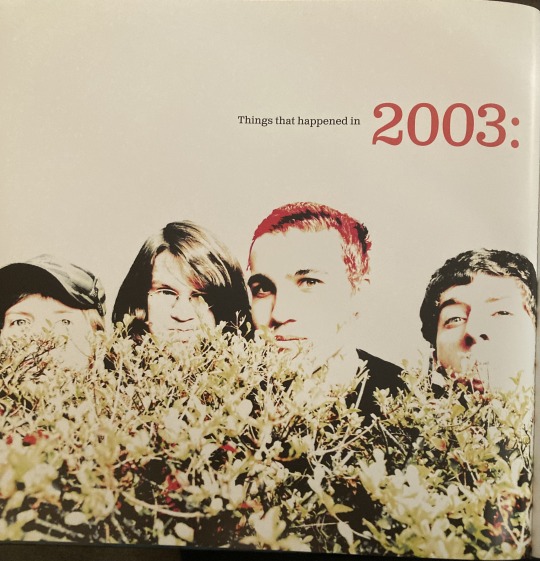
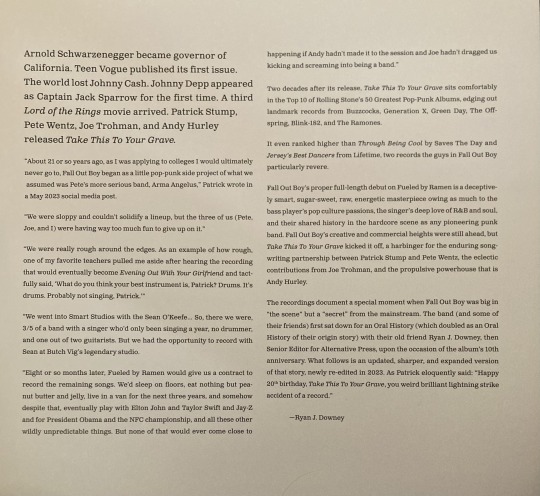
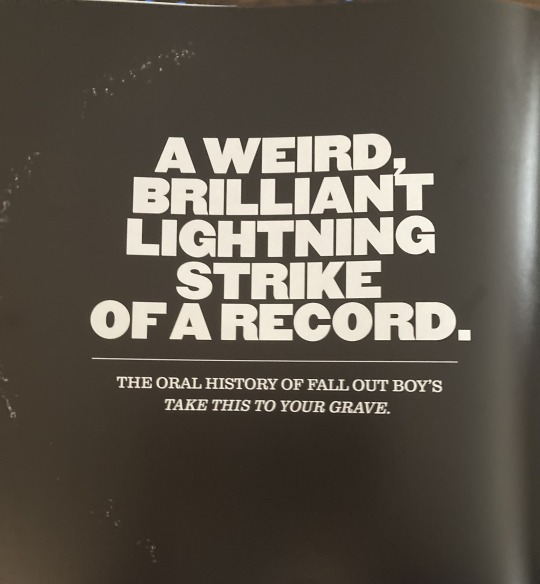
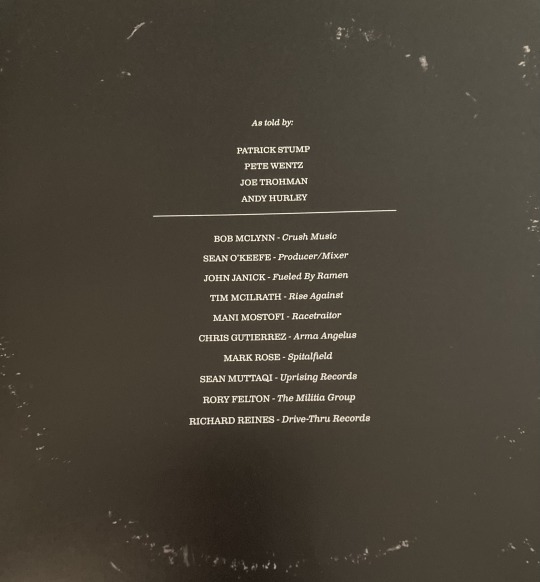
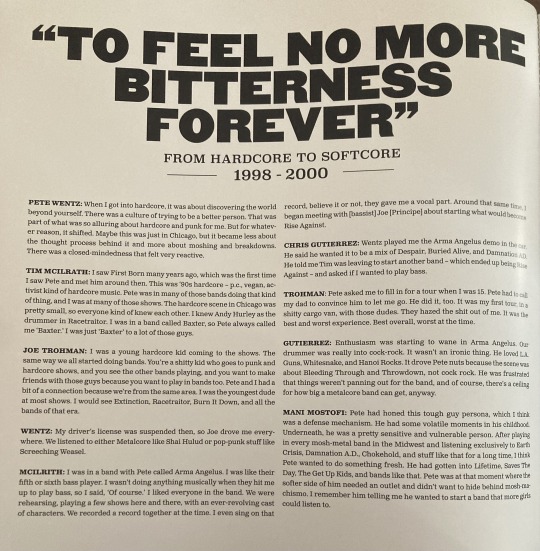
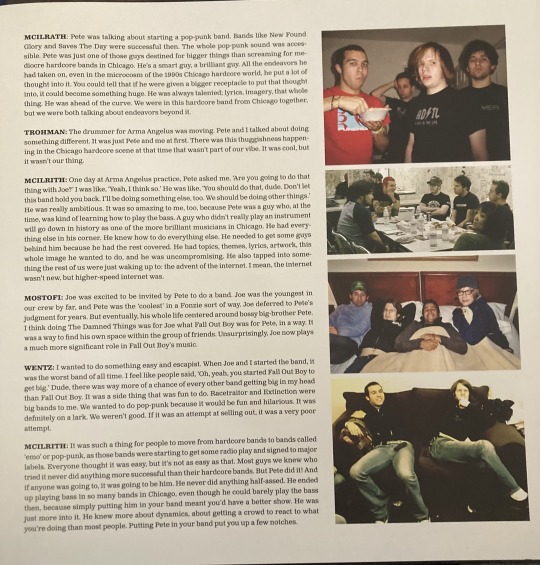

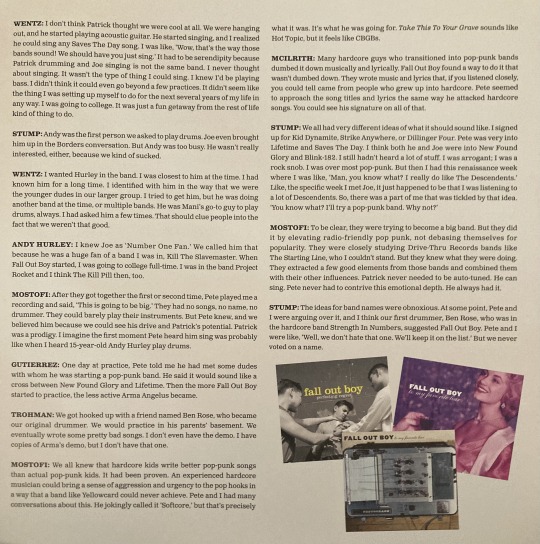
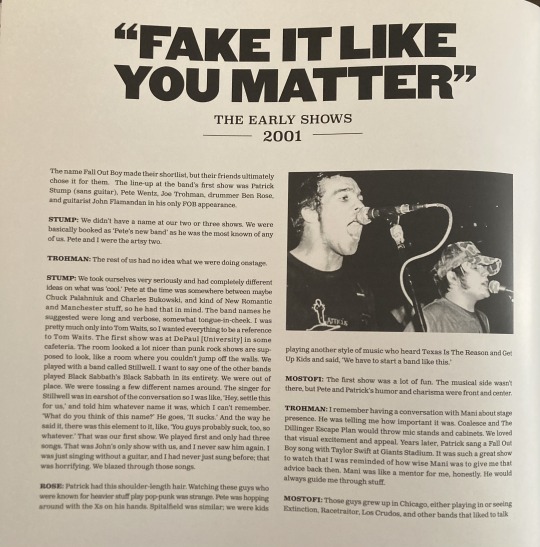
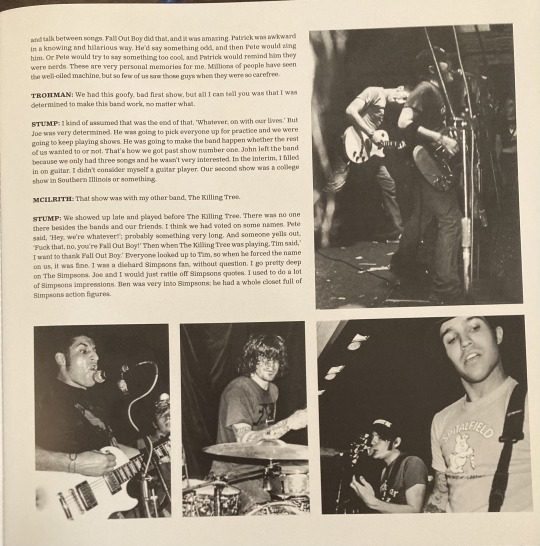
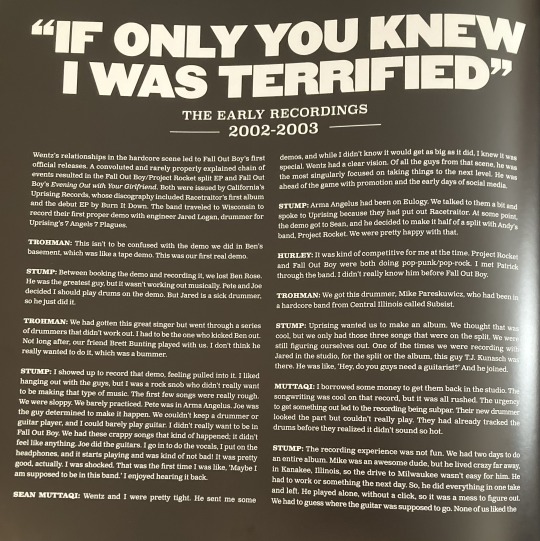
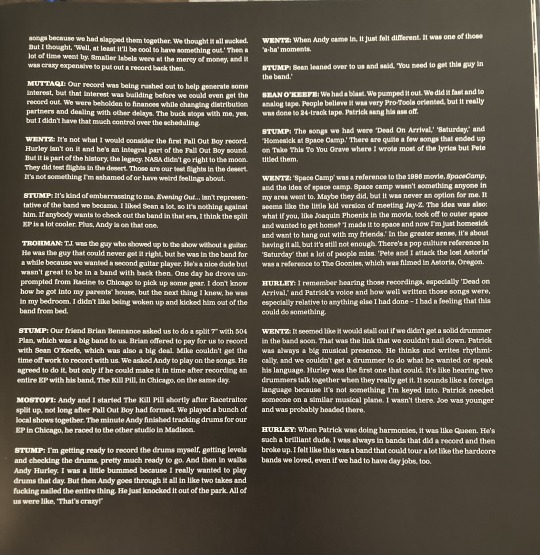
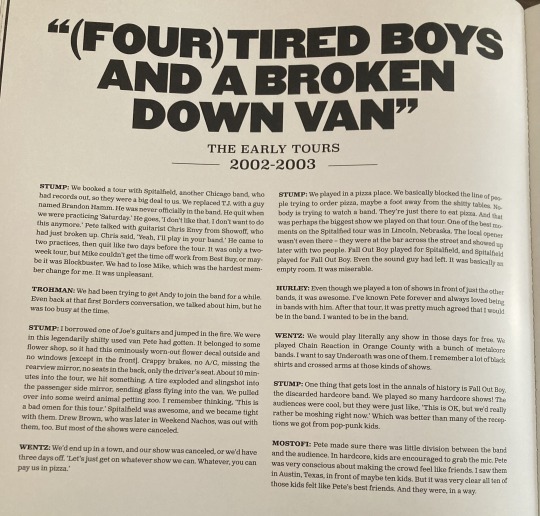
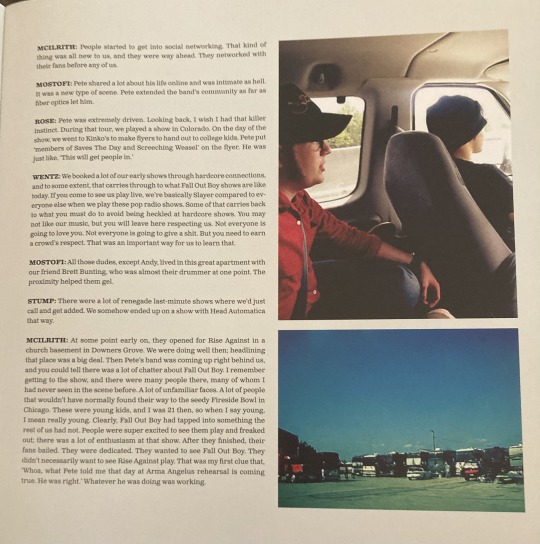
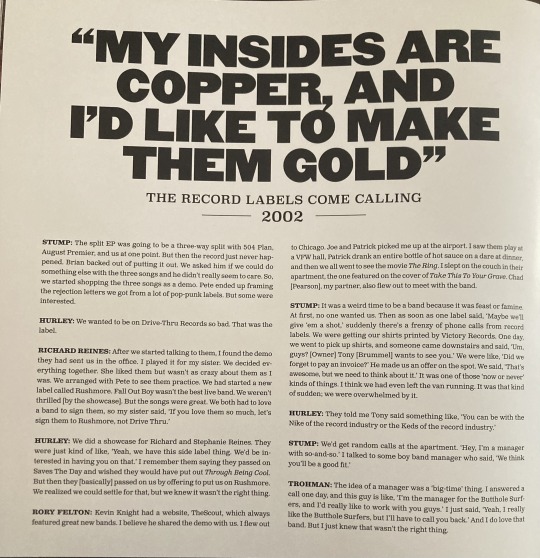
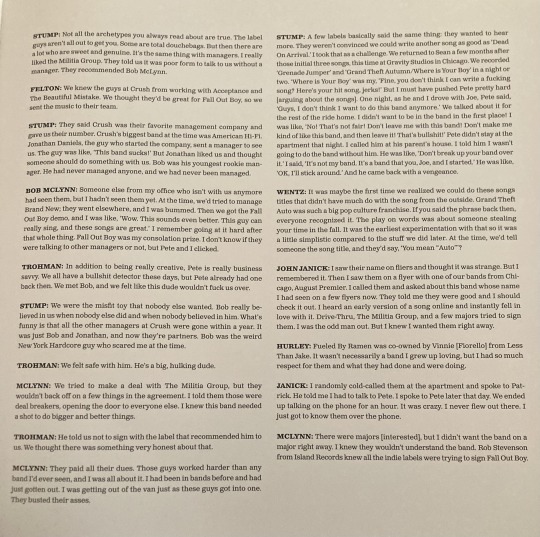
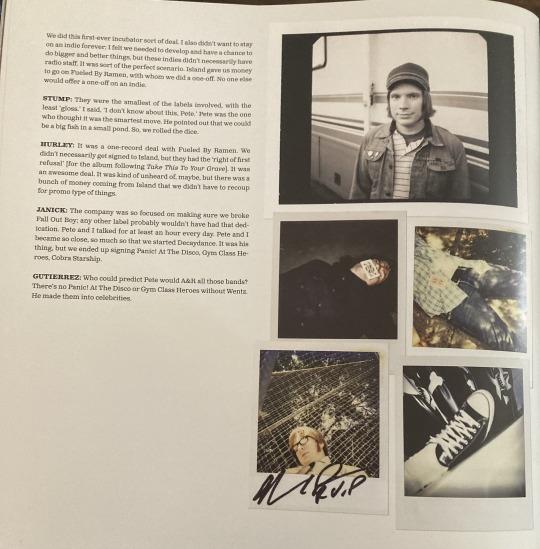
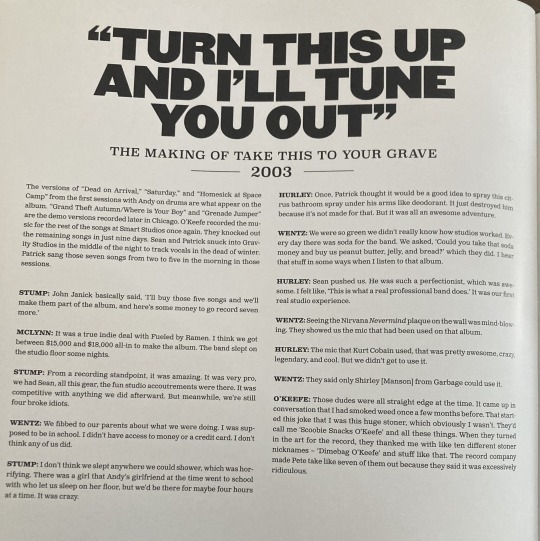
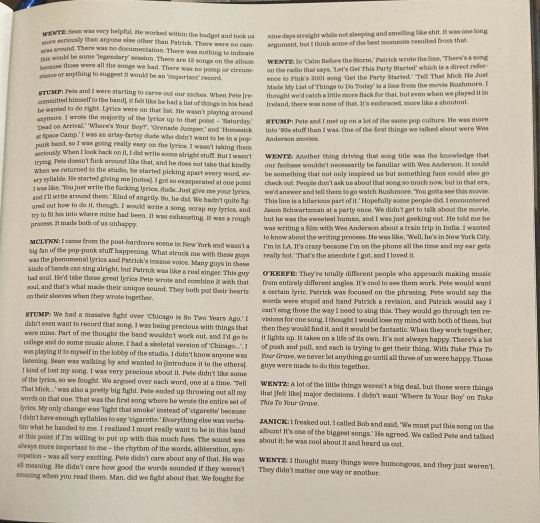
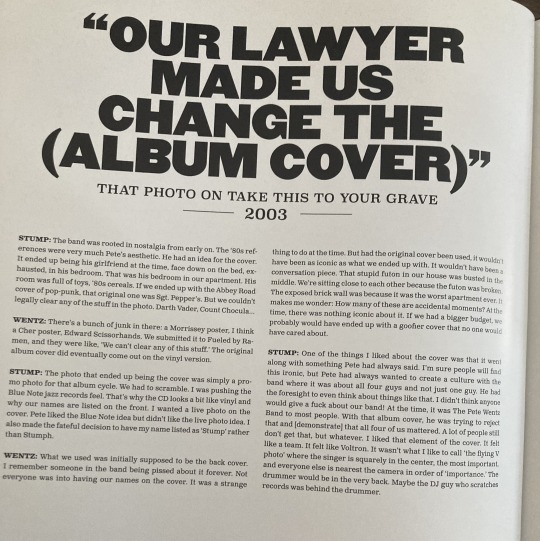
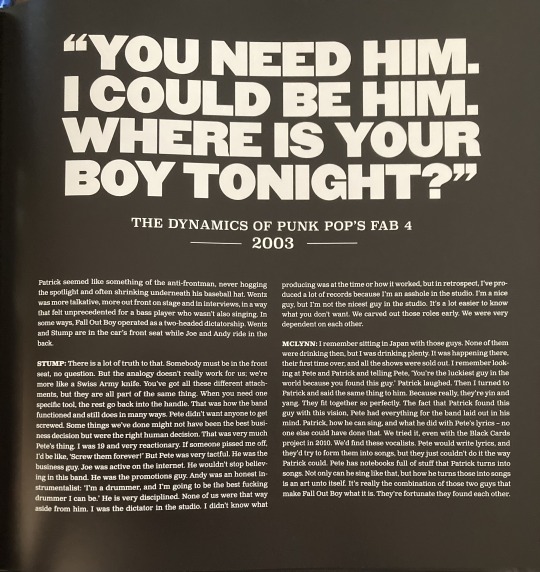
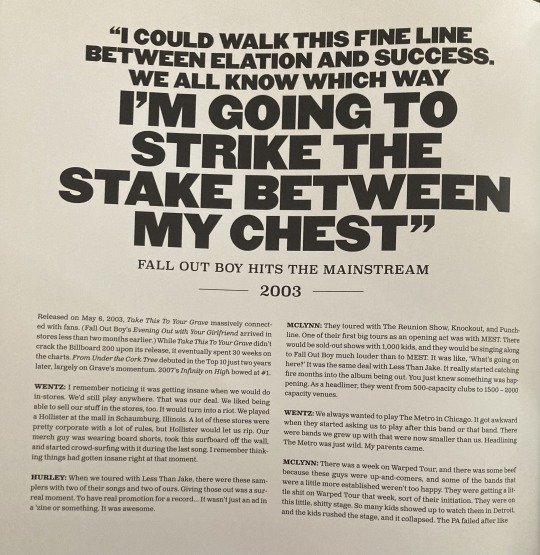
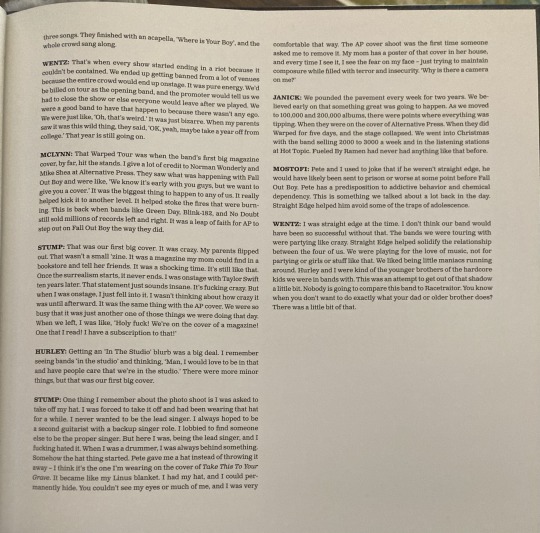
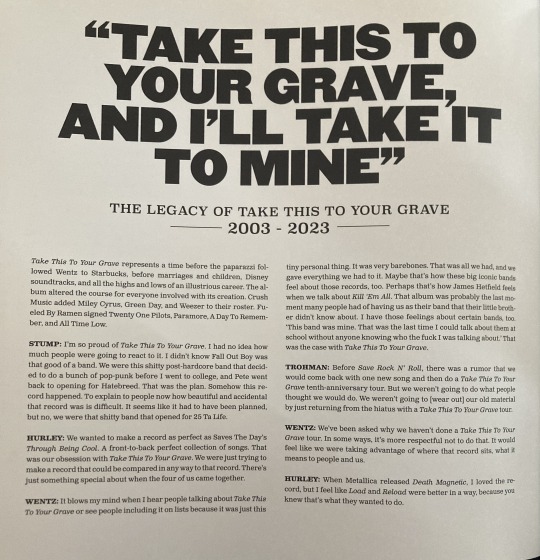
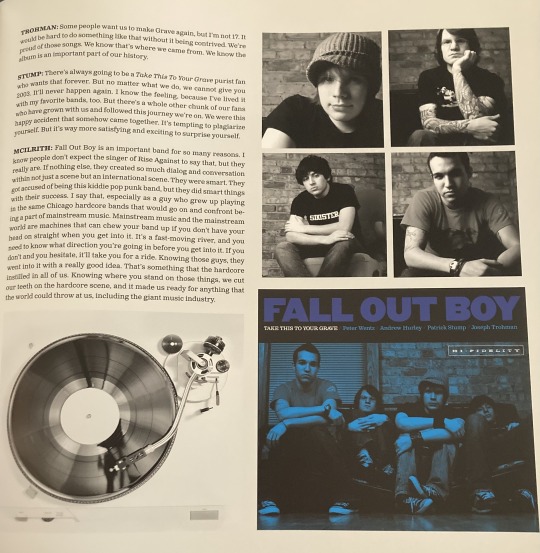
The pages that are just photographs, I haven't included. This post is already long enough.
Things that happened in 2003: Arnold Schwarzenegger became governor of California. Teen Vogue published its first issue. The world lost Johnny Cash. Johnny Depp appeared as Captain Jack Sparrow for the first time. A third Lord of the Rings movie arrived. Patrick Stump, Pete Wentz, Joe Trohman, and Andy Hurley released Take This To Your Grave.
"About 21 years ago or so, as I was applying to colleges I would ultimately never go to, Fall Out Boy began as a little pop-punk side project of what we assumed was Pete's more serious band, Arma Angelus," Patrick wrote in a May 2023 social media post.
"We were sloppy and couldn't solidify a lineup, but the three of us (Pete, Joe, and I) were having way too much fun to give up on it."
"We were really rough around the edges. As an example of how rough, one of my favorite teachers pulled me aside after hearing the recording that would eventually become Evening Out With Your Girlfriend and tactfully said, 'What do you think your best instrument is, Patrick? Drums. It's drums. Probably not singing, Patrick.'"
"We went into Smart Studios with the Sean O'Keefe... So, there we were, 3/5 of a band with a singer who'd only been singing a year, no drummer, and one out of two guitarists. But we had the opportunity to record with Sean at Butch Vig's legendary studio.
"Eight or so months later, Fueled by Ramen would give us a contract to record the remaining songs. We'd sleep on floors, eat nothing but peanut butter and jelly, live in a van for the next three years, and somehow despite that, eventually play with Elton John and Taylor Swift and Jay-Z and for President Obama and the NFC championship, and all these other wildly unpredictable things. But none of that would ever come close to happening if Andy hadn't made it to the session and Joe hadn't dragged us kicking and screaming into being a band."
Two decades after its release, Take This To Your Grave sits comfortable in the Top 10 of Rolling Stone's 50 Greatest Pop-Punk Albums, edging out landmark records from Buzzcocks, Generation X, Green Day, The Offspring, Blink-182, and The Ramones.
It even ranked higher than Through Being Cool by Saves The Day and Jersey's Best Dancers from Lifetime, two records the guys in Fall Out Boy particularly revere.
Fall Out Boy's proper full-length debut on Fueled by Ramen is a deceptively smart, sugar-sweet, raw, energetic masterpiece owing as much to the bass player's pop culture passions, the singers deep love of R&B and soul, and their shared history in the hardcore scene as any pioneering punk band. Fall Out Boy's creative and commercial heights were still ahead, but Take This To Your Grave kicked it off, a harbinger for the enduring songwriting partnership between Patrick Stump and Pete Wentz, the eclectic contributions from Joe Trohman, and the propulsive powerhouse that is Andy Hurley.
The recordings document a special moment when Fall Out Boy was big in "the scene" but a "secret" from the mainstream. The band (and some of their friends) first sat down for an Oral History (which doubled as an Oral History of their origin story) with their old friend Ryan J. Downey, then Senior Editor for Alternative Press, upon the occasion of the album's 10th anniversary. What follows is an updated, sharper, and expanded version of that story, newly re-edited in 2023. As Patrick eloquently said: "Happy 20th birthday, Take This To Your Grave, you weird brilliant lightning strike accident of a record."
– Ryan J. Downey.
A Weird, Brilliant Lightning Strike Of A Record. The Oral History Of Fall Out Boy's Take This To Your Grave.
As told by:
Patrick Stump
Pete Wentz
Joe Trohman
Andy Hurley
Bob McLynn - Crush Music
Sean O'Keefe - Producer/Mixer
John Janick - Fueled By Ramen
Tim McIlrath - Rise Against
Mani Mostofi - Racetraitor
Chris Gutierrez - Arma Angelus
Mark Rose - Spitalfield
Sean Muttaqi - Uprising Records
Rory Felton - The Militia Group
Richard Reines - Drive-Thru Records
"To Feel No More Bitterness Forever" - From Hardcore to Softcore, 1998-2000
PETE WENTZ: When I got into hardcore, it was about discovering the world beyond yourself. There was a culture of trying to be a better person. That was part of what was so alluring about hardcore and punk for me. But for whatever reason, it shifted. Maybe this was just in Chicago, but it became less about the thought process behind it and more about moshing and breakdowns. There was a close-mindedness that felt very reactive.
TIM MCILRITH: I saw First Born many years ago, which was the first time I saw Pete and met him around then. This was '90s hardcore - p.c., vegan, activist kind of hardcore music. Pete was in many of those bands doing that kind of thing, and I was at many of those shows. The hardcore scene in Chicago was pretty small, so everyone kind of knew each other. I knew Andy Hurley as the drummer in Racetraitor. I was in a band called Baxter, so Pete always called me 'Baxter.' I was just 'Baxter' to a lot of those guys.
JOE TROHMAN: I was a young hardcore kid coming to the shows. The same way we all started doing bands. You're a shitty kid who goes to punk and hardcore shows, and you see the other bands playing, and you want to make friends with those guys because you want to play in bands too. Pete and I had a bit of a connection because we're from the same area. I was the youngest dude at most shows. I would see Extinction, Racetraitor, Burn It Down, and all the bands of that era.
WENTZ: My driver's license was suspended then, so Joe drove me everywhere. We listened to either Metalcore like Shai Hulud or pop-punk stuff like Screeching Weasel.
MCILRITH: I was in a band with Pete called Arma Angelus. I was like their fifth or sixth bass player. I wasn't doing anything musically when they hit me up to play bass, so I said, 'Of course.' I liked everyone in the band. We were rehearsing, playing a few shows here and there, with an ever-revolving cast of characters. We recorded a record together at the time. I even sing on that record, believe it or not, they gave me a vocal part. Around that same time, I began meeting with [bassist] Joe [Principe] about starting what would become Rise Against.
CHRIS GUTIERREZ: Wentz played me the Arma Angelus demo in the car. He said he wanted it to be a mix of Despair, Buried Alive, and Damnation A.D. He told me Tim was leaving to start another band - which ended up being Rise Against - and asked if I wanted to play bass.
TROHMAN: Pete asked me to fill in for a tour when I was 15. Pete had to call my dad to convince him to let me go. He did it, too. It was my first tour, in a shitty cargo van, with those dudes. They hazed the shit out of me. It was the best and worst experience. Best overall, worst at the time.
GUTIERREZ: Enthusiasm was starting to wane in Arma Angelus. Our drummer was really into cock-rock. It wasn't an ironic thing. He loved L.A. Guns, Whitesnake, and Hanoi Rocks. It drove Pete nuts because the scene was about Bleeding Through and Throwdown, not cock rock. He was frustrated that things weren't panning out for the band, and of course, there's a ceiling for how big a metalcore band can get, anyway.
MANI MOSTOFI: Pete had honed this tough guy persona, which I think was a defense mechanism. He had some volatile moments in his childhood. Underneath, he was a pretty sensitive and vulnerable person. After playing in every mosh-metal band in the Midwest and listening exclusively to Earth Crisis, Damnation A.D., Chokehold, and stuff like that for a long time, I think Pete wanted to do something fresh. He had gotten into Lifetime, Saves The Day, The Get Up Kids, and bands like that. Pete was at that moment where the softer side of him needed an outlet, and didn't want to hide behind mosh-machismo. I remember him telling me he wanted to start a band that more girls could listen to.
MCILRATH: Pete was talking about starting a pop-punk band. Bands like New Found Glory and Saves The Day were successful then. The whole pop-punk sound was accessible. Pete was just one of those guys destined for bigger things than screaming for mediocre hardcore bands in Chicago. He's a smart guy, a brilliant guy. All the endeavors he had taken on, even in the microcosm of the 1990s Chicago hardcore world, he put a lot of though into it. You could tell that if he were given a bigger receptacle to put that thought into, it could become something huge. He was always talented: lyrics, imagery, that whole thing. He was ahead of the curve. We were in this hardcore band from Chicago together, but we were both talking about endeavors beyond it.
TROHMAN: The drummer for Arma Angelus was moving. Pete and I talked about doing something different. It was just Pete and me at first. There was this thuggishness happening in the Chicago hardcore scene at that time that wasn't part of our vibe. It was cool, but it wasn't our thing.
MCILRITH: One day at Arma Angelus practice, Pete asked me, 'Are you going to do that thing with Joe?' I was like, 'Yeah, I think so.' He was like, 'You should do that, dude. Don't let this band hold you back. I'll be doing something else, too. We should be doing other things.' He was really ambitious. It was so amazing to me, too, because Pete was a guy who, at the time, was kind of learning how to play the bass. A guy who didn't really play an instrument will do down in history as one of the more brilliant musicians in Chicago. He had everything else in his corner. He knew how to do everything else. He needed to get some guys behind him because he had the rest covered. He had topics, themes, lyrics, artwork, this whole image he wanted to do, and he was uncompromising. He also tapped into something the rest of us were just waking up to: the advent of the internet. I mean, the internet wasn't new, but higher-speed internet was.
MOSTOFI: Joe was excited to be invited by Pete to do a band. Joe was the youngest in our crew by far, and Pete was the 'coolest' in a Fonzie sort of way. Joe deferred to Pete's judgement for years. But eventually, his whole life centered around bossy big-brother Pete. I think doing The Damned Things was for Joe what Fall Out Boy was for Pete, in a way. It was a way to find his own space within the group of friends. Unsurprisingly, Joe now plays a much more significant role in Fall Out Boy's music.
WENTZ: I wanted to do something easy and escapist. When Joe and I started the band, it was the worst band of all time. I feel like people said, 'Oh, yeah, you started Fall Out Boy to get big.' Dude, there was way more of a chance of every other band getting big in my head than Fall Out Boy. It was a side thing that was fun to do. Racetraitor and Extinction were big bands to me. We wanted to do pop-punk because it would be fun and hilarious. It was definitely on a lark. We weren't good. If it was an attempt at selling out, it was a very poor attempt.
MCILRITH: It was such a thing for people to move from hardcore bands to bands called 'emo' or pop-punk, as those bands were starting to get some radio play and signed to major labels. Everyone thought it was easy, but it's not as easy as that. Most guys we knew who tried it never did anything more successful than their hardcore bands. But Pete did it! And if anyone was going to, it was going to be him. He never did anything half-assed. He ended up playing bass in so many bands in Chicago, even though he could barely play the bass then, because simply putting him in your band meant you'd have a better show. He was just more into it. He knew more about dynamics, about getting a crowd to react to what you're doing than most people. Putting Pete in your band put you up a few notches.
"I'm Writing You A Chorus And Here Is Your Verse" - When Pete met Patrick, early 2001.
MARK ROSE: Patrick Stump played drums in this grindcore band called Grinding Process. They had put out a live split cassette tape.
PATRICK STUMP: My ambition always outweighed my ability or actual place in the world. I was a drummer and played in many bands and tried to finagle my way into better ones but never really managed. I was usually outgunned by the same two guys: this guy Rocky Senesce; I'm not sure if he's playing anymore, but he was amazing. And this other guy, De'Mar Hamilton, who is now in Plain White T's. We'd always go out for the same bands. I felt like I was pretty good, but then those guys just mopped the floor with me. I hadn't been playing music for a few months. I think my girlfriend dumped me. I was feeling down. I wasn't really into pop-punk or emo. I think at the time I was into Rhino Records box sets.
TROHMAN: I was at the Borders in Eden's Plaza in Wilmette, Illinois. My friend Arthur was asking me about Neurosis. Patrick just walked up and started talking to me.
STUMP: I was a bit arrogant and cocky, like a lot of young musicians. Joe was talking kind of loudly and I overheard him say something about Neurosis, and I think I came in kind of snotty, kind of correcting whatever they had said.
TROHMAN: We just started talking about music, and my buddy Arthur got shoved out of the conversation. I told him about the band we were starting. Pete was this local hardcore celebrity, which intrigued Patrick.
STUMP: I had similar conversations with any number of kids my age. This conversation didn't feel crazy special. That's one of the things that's real about [Joe and I meeting], and that's honest about it, that's it's not some 'love at first sight' thing where we started talking about music and 'Holy smokes, we're going to have the best band ever!' I had been in a lot of bands up until then. Hardcore was a couple of years away from me at that point. I was over it, but Pete was in real bands; that was interesting. Now I'm curious and I want to do this thing, or at least see what happens. Joe said they needed a drummer, guitar player, or singer, and I kind of bluffed and said I could do any one of those things for a pop-punk band. I'd had a lot of conversations about starting bands where I meet up with somebody and maybe try to figure out some songs and then we'd never see each other again. There were a lot of false starts and I assumed this would be just another one of those, but it would be fun for this one to be with the guy from Racetraitor and Extinction.
TROHMAN: He gave me the link to his MP3.com page. There were a few songs of him just playing acoustic and singing. He was awesome.
WENTZ: Joe told me we were going to this kid's house who would probably be our drummer but could also sing. He sent me a link to Patrick singing some acoustic thing, but the quality was so horrible it was hard to tell what it was. Patrick answered the door in some wild outfit. He looked like an emo kid but from the Endpoint era - dorky and cool. We went into the basement, and he was like, trying to set up his drums.
TROHMAN: Patrick has said many times that he intended to try out on drums. I was pushing for him to sing after hearing his demos. 'Hey! Sing for us!' I asked him to take out his acoustic guitar. He played songs from Saves The Day's Through Being Cool. I think he sang most of the record to us. We were thrilled. We had never been around someone who could sing like that.
WENTZ: I don't think Patrick thought we were cool at all. We were hanging out, and he started playing acoustic guitar. He started singing, and I realized he could sing any Saves The Day song. I was like, 'Wow, that's the way those bands sound! We should just have you sing.' It had to be serendipity because Patrick drumming and Joe singing is not the same band. I never thought about singing. It wasn't the type of thing I could sing. I knew I'd be playing bass. I didn't think it'd even go beyond a few practices. It didn't seem like the thing I was setting myself up to do for the next several years of my life in any way. I was going to college. It was just a fun getaway from the rest of life kind of thing to do.
STUMP: Andy was the first person we asked to play drums. Joe even brought him up in the Borders conversation. But Andy was too busy. He wasn't really interested, either, because we kind of sucked.
WENTZ: I wanted Hurley in the band, I was closest to him at the time, I had known him for a long time. I identified with him in the way that we were the younger dudes in our larger group. I tried to get him, but he was doing another band at the time, or multiple bands. He was Mani's go-to guy to play drums, always. I had asked him a few times. That should clue people into the fact that we weren't that good.
ANDY HURLEY: I knew Joe as 'Number One Fan.' We called him that because he was a huge fan of a band I was in, Kill The Slavemaster. When Fall Out Boy started, I was going to college full-time. I was in the band Project Rocket and I think The Kill Pill then, too.
MOSTOFI: After they got together the first or second time, Pete played me a recording and said, 'This is going to be big.' They had no songs, no name, no drummer. They could barely play their instruments. But Pete knew, and we believed him because we could see his drive and Patrick's potential. Patrick was prodigy. I imagine the first moment Pete heard him sing was probably like when I heard 15-year-old Andy Hurley play drums.
GUTIERREZ: One day at practice, Pete told me he had met some dudes with whom he was starting a pop-punk band. He said it would sound like a cross between New Found Glory and Lifetime. Then the more Fall Out Boy started to practice, the less active Arma Angelus became.
TROHMAN: We got hooked up with a friend named Ben Rose, who became our original drummer. We would practice in his parents' basement. We eventually wrote some pretty bad songs. I don't even have the demo. I have copies of Arma's demo, but I don't have that one.
MOSTOFI: We all knew that hardcore kids write better pop-punk songs than actual pop-punk kids. It had been proven. An experienced hardcore musician could bring a sense of aggression and urgency to the pop hooks in a way that a band like Yellowcard could never achieve. Pete and I had many conversations about this. He jokingly called it 'Softcore,' but that's precisely what it was. It's what he was going for. Take This To Your Grave sounds like Hot Topic, but it feels like CBGBs.
MCILRITH: Many hardcore guys who transitioned into pop-punk bands dumbed it down musically and lyrically. Fall Out Boy found a way to do it that wasn't dumbed down. They wrote music and lyrics that, if you listened closely, you could tell came from people who grew up into hardcore. Pete seemed to approach the song titles and lyrics the same way he attacked hardcore songs. You could see his signature on all of that.
STUMP: We all had very different ideas of what it should sound like. I signed up for Kid Dynamite, Strike Anywhere, or Dillinger Four. Pete was very into Lifetime and Saves The Day. I think both he and Joe were into New Found Glory and Blink-182. I still hadn't heard a lot of stuff. I was arrogant; I was a rock snob. I was over most pop-punk. But then I had this renaissance week where I was like, 'Man, you know what? I really do like The Descendents.' Like, the specific week I met Joe, it just happened to be that I was listening to a lot of Descendents. So, there was a part of me that was tickled by that idea. 'You know what? I'll try a pop-punk band. Why not?'
MOSTOFI: To be clear, they were trying to become a big band. But they did it by elevating radio-friendly pop punk, not debasing themselves for popularity. They were closely studying Drive-Thru Records bands like The Starting Line, who I couldn't stand. But they knew what they were doing. They extracted a few good elements from those bands and combined them with their other influences. Patrick never needed to be auto-tuned. He can sing. Pete never had to contrive this emotional depth. He always had it.
STUMP: The ideas for band names were obnoxious. At some point, Pete and I were arguing over it, and I think our first drummer, Ben Rose, who was in the hardcore band Strength In Numbers, suggested Fall Out Boy. Pete and I were like, 'Well, we don't hate that one. We'll keep it on the list.' But we never voted on a name.
"Fake It Like You Matter" - The Early Shows, 2001
The name Fall Out Boy made their shortlist, but their friends ultimately chose it for them. The line-up at the band's first show was Patrick Stump (sans guitar), Pete Wentz, Joe Trohman, drummer Ben Rose, and guitarist John Flamandan in his only FOB appearance.
STUMP: We didn't have a name at our two or three shows. We were basically booked as 'Pete's new band' as he was the most known of any of us. Pete and I were the artsy two.
TROHMAN: The rest of us had no idea what we were doing onstage.
STUMP: We took ourselves very seriously and completely different ideas on what was 'cool.' Pete at the time was somewhere between maybe Chuck Palahniuk and Charles Bukowski, and kind of New Romantic and Manchester stuff, so he had that in mind. The band names he suggested were long and verbose, somewhat tongue-in-cheek. I was pretty much only into Tom Waits, so I wanted everything to be a reference to Tom Waits. The first show was at DePaul [University] in some cafeteria. The room looked a lot nicer than punk rock shows are supposed to look, like a room where you couldn't jump off the walls. We played with a band called Stillwell. I want to say one of the other bands played Black Sabbath's Black Sabbath in its entirety. We were out of place. We were tossing a few different names around. The singer for Stillwell was in earshot of the conversation so I was like 'Hey, settle this for us,' and told him whatever name it was, which I can't remember. 'What do you think of this name?' He goes, 'It sucks.' And the way he said it, there was this element to it, like, 'You guys probably suck, too, so whatever.' That was our first show. We played first and only had three songs. That was John's only show with us, and I never saw him again. I was just singing without a guitar, and I had never just sung before; that was horrifying. We blazed through those songs.
ROSE: Patrick had this shoulder-length hair. Watching these guys who were known for heavier stuff play pop-punk was strange. Pete was hopping around with the X's on his hands. Spitalfield was similar; we were kids playing another style of music who heard Texas Is The Reason and Get Up Kids and said, 'We have to start a band like this.'
MOSTOFI: The first show was a lot of fun. The musical side wasn't there, but Pete and Patrick's humor and charisma were front and center.
TROHMAN: I remember having a conversation with Mani about stage presence. He was telling me how important it was. Coalesce and The Dillinger Escape Plan would throw mic stands and cabinets. We loved that visual excitement and appeal. Years later, Patrick sang a Fall Out Boy song with Taylor Swift at Giants Stadium. It was such a great show to watch that I was reminded of how wise Mani was to give me that advice back then. Mani was like a mentor for me, honestly. He would always guide me through stuff.
MOSTOFI: Those guys grew up in Chicago, either playing in or seeing Extinction, Racetraitor, Los Crudos, and other bands that liked to talk and talk between songs. Fall Out Boy did that, and it was amazing. Patrick was awkward in a knowing and hilarious way. He'd say something odd, and then Pete would zing him. Or Pete would try to say something too cool, and Patrick would remind him they were nerds. These are very personal memories for me. Millions of people have seen the well-oiled machine, but so few of us saw those guys when they were so carefree.
TROHMAN: We had this goofy, bad first show, but all I can tell you was that I was determined to make this band work, no matter what.
STUMP: I kind of assumed that was the end of that. 'Whatever, on with our lives.' But Joe was very determined. He was going to pick us up for practice and we were going to keep playing shows. He was going to make the band happen whether the rest of us wanted to or not. That's how we got past show number one. John left the band because we only had three songs and he wasn't very interested. In the interim, I filled in on guitar. I didn't consider myself a guitar player. Our second show was a college show in Southern Illinois or something.
MCILRITH: That show was with my other band, The Killing Tree.
STUMP: We showed up late and played before The Killing Tree. There was no one there besides the bands and our friends. I think we had voted on some names. Pete said 'Hey, we're whatever!'; probably something very long. And someone yells out, 'Fuck that, no, you're Fall Out Boy!' Then when The Killing Tree was playing, Tim said, 'I want to thank Fall Out Boy.' Everyone looked up to Tim, so when he forced the name on us, it was fine. I was a diehard Simpsons fan, without question. I go pretty deep on The Simpsons. Joe and I would just rattle off Simpsons quotes. I used to do a lot of Simpsons impressions. Ben was very into Simpsons; he had a whole closet full of Simpsons action figures.
"If Only You Knew I Was Terrified" - The Early Recordings, 2002-2003
Wentz's relationships in the hardcore scene led to Fall Out Boy's first official releases. A convoluted and rarely properly explained chain of events resulted in the Fall Out Boy/Project Rocket split EP and Fall Out Boy's Evening Out with Your Girlfriend. Both were issued by California's Uprising Records, whose discography included Racetraitor's first album and the debut EP by Burn It Down. The band traveled to Wisconsin to record their first proper demo with engineer Jared Logan, drummer for Uprising's 7 Angels 7 Plagues.
TROHMAN: This isn't to be confused with the demo we did in Ben's basement, which was like a tape demo. This was our first real demo.
STUMP: Between booking the demo and recording it, we lost Ben Rose. He was the greatest guy, but it wasn't working out musically. Pete and Joe decided I should play drums on the demo. But Jared is a sick drummer, so he just did it.
TROHMAN: We had gotten this great singer but went through a series of drummers that didn't work out. I had to be the one who kicked Ben out. Not long after, our friend Brett Bunting played with us. I don't think he really wanted to do it, which was a bummer.
STUMP: I showed up to record that demo, feeling pulled into it. I liked hanging out with the guys, but I was a rock snob who didn't really want to be making that type of music. The first few songs were really rough. We were sloppy. We barely practiced. Pete was in Arma Angelus. Joe was the guy determined to make it happen. We couldn't keep a drummer or guitar player, and I could barely play guitar. I didn't really want to be in Fall Out Boy. We had these crappy songs that kind of happened; it didn't feel like anything. Joe did the guitars. I go in to do the vocals, I put on the headphones, and it starts playing and was kind of not bad! It was pretty good, actually. I was shocked. That was the first time I was like, 'Maybe I am supposed to be in this band.' I enjoyed hearing it back.
SEAN MUTTAQI: Wentz and I were pretty tight. He sent me some demos, and while I didn't know it would get as big as it did, I knew it was special. Wentz had a clear vision. Of all the guys from that scene, he was the most singularly focused on taking things to the next level. He was ahead of the game with promotion and the early days of social media.
STUMP: Arma Angelus had been on Eulogy. We talked to them a bit and spoke to Uprising because they had put out Racetraitor. At some point, the demo got to Sean, and he decided to make it half of a split with Andy's band, Project Rocket. We were pretty happy with that.
HURLEY: It was kind of competitive for me at the time. Project Rocket and Fall Out Boy were both doing pop-punk/pop-rock, I met Patrick through the band. I didn't really know him before Fall Out Boy.
TROHMAN: We got this drummer, Mike Pareskuwicz, who had been in a hardcore band from Central Illinois called Subsist.
STUMP: Uprising wanted us to make an album. We thought that was cool, but we only had those three songs that were on the split. We were still figuring ourselves out. One of the times we were recording with Jared in the studio, for the split or the album, this guy T.J. Kunasch was there. He was like, 'Hey, do you guys need a guitarist?' And he joined.
MUTTAQI: I borrowed some money to get them back in the studio. The songwriting was cool on that record, but it was all rushed. The urgency to get something out led to the recording being subpar. Their new drummer looked the part but couldn't really play. They had already tracked the drums before they realized it didn't sound so hot.
STUMP: The recording experience was not fun. We had two days to do an entire album. Mike was an awesome dude, but he lived crazy far away, in Kanakee, Illinois, so the drive to Milwaukee wasn't easy for him. He had to work or something the next day. So, he did everything in one take and left. He played alone, without a click, so it was a ness to figure out. We had to guess where the guitar was supposed to go. None of us liked the songs because we had slapped them together. We thought it all sucked. But I thought, 'Well, at least it'll be cool to have something out.' Then a lot of time went by. Smaller labels were at the mercy of money, and it was crazy expensive to put out a record back then.
MUTTAQI: Our record was being rushed out to help generate some interest, but that interest was building before we could even get the record out. We were beholden to finances while changing distribution partners and dealing with other delays. The buck stops with me, yes, but I didn't have that much control over the scheduling.
WENTZ: It's not what I would consider the first Fall Out Boy record. Hurley isn't on it and he's an integral part of the Fall Out Boy sound. But it is part of the history, the legacy. NASA didn't go right to the moon. They did test flights in the desert. Those are our test flights in the desert. It's not something I'm ashamed of or have weird feelings about.
STUMP: It's kind of embarrassing to me. Evening Out... isn't representative of the band we became. I liked Sean a lot, so it's nothing against him. If anybody wants to check out the band in that era, I think the split EP is a lot cooler. Plus, Andy is on that one.
TROHMAN: T.J. was the guy who showed up to the show without a guitar. He was the guy that could never get it right, but he was in the band for a while because we wanted a second guitar player. He's a nice dude but wasn't great to be in a band with back then. One day he drove unprompted from Racine to Chicago to pick up some gear. I don't know how he got into my parents' house, but the next thing I knew, he was in my bedroom. I didn't like being woken up and kicked him out of the band from bed.
STUMP: Our friend Brian Bennance asked us to do a split 7" with 504 Plan, which was a big band to us. Brian offered to pay for us to record with Sean O'Keefe, which was also a big deal. Mike couldn't get the time off work to record with us. We asked Andy to play on the songs. He agreed to do it, but only if he could make it in time after recording an entire EP with his band, The Kill Pill, in Chicago, on the same day.
MOSTOFI: Andy and I started The Kill Pill shortly after Racetraitor split up, not long after Fall Out Boy had formed. We played a bunch of local shows together. The minute Andy finished tracking drums for our EP in Chicago, he raced to the other studio in Madison.
STUMP: I'm getting ready to record the drums myself, getting levels and checking the drums, pretty much ready to go. And then in walks Andy Hurley. I was a little bummed because I really wanted to play drums that day. But then Andy goes through it all in like two takes and fucking nailed the entire thing. He just knocked it out of the park. All of us were like, 'That's crazy!'
WENTZ: When Andy came in, It just felt different. It was one of those 'a-ha' moments.
STUMP: Sean leaned over to us and said, 'You need to get this guy in the band.'
SEAN O'KEEFE: We had a blast. We pumped It out. We did it fast and to analog tape. People believe it was very Pro Tools oriented, but it really was done to 24-track tape. Patrick sang his ass off.
STUMP: The songs we had were 'Dead On Arrival,' 'Saturday,' and 'Homesick at Space Camp. There are quite a few songs that ended up on Take This To You Grave where I wrote most of the lyrics but Pete titled them.
WENTZ: 'Space Camp' was a reference to the 1986 movie, SpaceCamp, and the idea of space camp. Space camp wasn't something anyone in my area went to. Maybe they did, but it was never an option for me. It seems like the little kid version of meeting Jay-Z. The idea was also: what if you, like Joaquin Phoenix in the movie, took off to outer space and wanted to get home? 'I made it to space and now I'm just homesick and want to hang out with my friends.' In the greater sense, it's about having it all, but it's still not enough. There's a pop culture reference in 'Saturday' that a lot of people miss. 'Pete and I attack the lost Astoria' was a reference to The Goonies, which was filmed in Astoria, Oregon.
HURLEY: I remember hearing those recordings, especially 'Dead on Arrival,' and Patrick's voice and how well written those songs were, especially relative to anything else I had done - I had a feeling that this could do something.
WENTZ: It seemed like it would stall out if we didn't get a solid drummer in the band soon. That was the link that we couldn't nail down. Patrick was always a big musical presence. He thinks and writes rhythmi-cally, and we couldn't get a drummer to do what he wanted or speak his language. Hurley was the first one that could. It's like hearing two drummers talk together when they really get it. It sounds like a foreign language because it's not something I'm keyed into. Patrick needed someone on a similar musical plane. I wasn't there. Joe was younger and was probably headed there.
HURLEY: When Patrick was doing harmonies, it was like Queen. He's such a brilliant dude. I was always in bands that did a record and then broke up. I felt like this was a band that could tour a lot like the hardcore bands we loved, even if we had to have day jobs, too.
"(Four) Tired Boys And A Broken Down Van" - The Early Tours, 2002-2003
STUMP: We booked a tour with Spitalfield, another Chicago band, who had records out, so they were a big deal to us. We replaced T.J. with a guy named Brandon Hamm. He was never officially in the band. He quit when we were practicing 'Saturday.' He goes, 'I don't like that. I don't want to do this anymore.' Pete talked with guitarist Chris Envy from Showoff, who had just broken up. Chris said, 'Yeah, I'll play in your band.' He came to two practices, then quit like two days before the tour. It was only a two-week tour, but Mike couldn't get the time off work from Best Buy, or maybe it was Blockbuster. We had to lose Mike, which was the hardest member change for me. It was unpleasant.
TROHMAN: We had been trying to get Andy to join the band for a while. Even back at that first Borders conversation, we talked about him, but he was too busy at the time.
STUMP: I borrowed one of Joe's guitars and jumped in the fire. We were in this legendarily shitty used van Pete had gotten. It belonged to some flower shop, so it had this ominously worn-out flower decal outside and no windows [except in the front]. Crappy brakes, no A/C, missing the rearview mirror, no seats in the back, only the driver's seat. About 10 minutes into the tour, we hit something. A tire exploded and slingshot into the passenger side mirror, sending glass flying into the van. We pulled over into some weird animal petting zoo. I remember thinking, 'This is a bad omen for this tour.' Spitalfield was awesome, and we became tight with them. Drew Brown, who was later in Weekend Nachos, was out with them, too. But most of the shows were canceled.
WENTZ: We'd end up in a town, and our show was canceled, or we'd have three days off. 'Let's just get on whatever show we can. Whatever, you can pay us in pizza.'
STUMP: We played in a pizza place. We basically blocked the line of people trying to order pizza, maybe a foot away from the shitty tables. Nobody is trying to watch a band. They're just there to eat pizza. And that was perhaps the biggest show we played on that tour. One of the best moments on the Spitalfied tour was in Lincoln, Nebraska. The local opener wasn't even there - they were at the bar across the street and showed up later with two people. Fall Out Boy played for Spitalfield, and Spitalfield played for Fall Out Boy. Even the sound guy had left. It was basically an empty room. It was miserable.
HURLEY: Even though we played a ton of shows in front of just the other bands, it was awesome. I've known Pete forever and always loved being in bands with him. After that tour, it was pretty much agreed that I would be in the band. I wanted to be in the band.
WENTZ: We would play literally any show in those days for free. We played Chain Reaction in Orange County with a bunch of metalcore bands. I want to say Underoath was one of them. I remember a lot of black shirts and crossed arms at those kinds of shows. STUMP: One thing that gets lost in the annals of history is Fall Out Boy, the discarded hardcore band. We played so many hardcore shows! The audiences were cool, but they were just like, 'This is OK, but we'd really rather be moshing right now.' Which was better than many of the receptions we got from pop-punk kids.
MOSTOFI: Pete made sure there was little division between the band and the audience. In hardcore, kids are encouraged to grab the mic. Pete was very conscious about making the crowd feel like friends. I saw them in Austin, Texas, in front of maybe ten kids. But it was very clear all ten of those kids felt like Pete's best friends. And they were, in a way.
MCILRITH: People started to get into social networking. That kind of thing was all new to us, and they were way ahead. They networked with their fans before any of us.
MOSTOFI: Pete shared a lot about his life online and was intimate as hell. It was a new type of scene. Pete extended the band's community as far as fiber optics let him.
ROSE: Pete was extremely driven. Looking back, I wish I had that killer instinct. During that tour; we played a show in Colorado. On the day of the show, we went to Kinko's to make flyers to hand out to college kids. Pete put ‘members of Saves The Day and Screeching Weasel’ on the flyer. He was just like, 'This will get people in.'
WENTZ: We booked a lot of our early shows through hardcore connections, and to some extent, that carries through to what Fall Out Boy shows are like today. If you come to see us play live, we're basically Slayer compared to everyone else when we play these pop radio shows. Some of that carries back to what you must do to avoid being heckled at hardcore shows. You may not like our music, but you will leave here respecting us. Not everyone is going to love you. Not everyone is going to give a shit. But you need to earn a crowd's respect. That was an important way for us to learn that.
MOSTOFI: All those dudes, except Andy, lived in this great apartment with our friend Brett Bunting, who was almost their drummer at one point. The proximity helped them gel.
STUMP: There were a lot of renegade last-minute shows where we'd just call and get added. We somehow ended up on a show with Head Automatica that way.
MCILRITH: At some point early on, they opened for Rise Against in a church basement in Downers Grove. We were doing well then; headlining that place was a big deal. Then Pete's band was coming up right behind us, and you could tell there was a lot of chatter about Fall Out Boy. I remember getting to the show, and there were many people there, many of whom I had never seen in the scene before. A lot of unfamiliar faces. A lot of people that wouldn't have normally found their way to the seedy Fireside Bowl in Chicago. These were young kids, and I was 21 then, so when I say young, I mean really young. Clearly, Fall Out Boy had tapped into something the rest of us had not. People were super excited to see them play and freaked out; there was a lot of enthusiasm at that show. After they finished, their fans bailed. They were dedicated. They wanted to see Fall Out Boy. They didn't necessarily want to see Rise Against play. That was my first clue that, 'Whoa, what Pete told me that day at Arma Angelus rehearsal is coming true. He was right.' Whatever he was doing was working.
"My Insides Are Copper, And I'd Like To Make Them Gold" - The Record Labels Come Calling, 2002
STUMP: The split EP was going to be a three-way split with 504 Plan, August Premier, and us at one point. But then the record just never happened. Brian backed out of putting it out. We asked him if we could do something else with the three songs and he didn't really seem to care. So, we started shopping the three songs as a demo. Pete ended up framing the rejection letters we got from a lot of pop-punk labels. But some were interested.
HURLEY: We wanted to be on Drive-Thru Records so bad. That was the label.
RICHARD REINES: After we started talking to them, I found the demo they had sent us in the office. I played it for my sister. We decided everything together. She liked them but wasn't as crazy about them as I was. We arranged with Pete to see them practice. We had started a new label called Rushmore. Fall Out Boy wasn't the best live band. We weren't thrilled [by the showcase]. But the songs were great. We both had to love a band to sign them, so my sister said, 'If you love them so much, let's sign them to Rushmore, not Drive Thru.'
HURLEY: We did a showcase for Richard and Stephanie Reines. They were just kind of like, 'Yeah, we have this side label thing. We'd be interested in having you on that.' I remember them saying they passed on Saves The Day and wished they would have put out Through Being Cool. But then they [basically] passed on us by offering to put us on Rushmore. We realized we could settle for that, but we knew it wasn't the right thing.
RORY FELTON: Kevin Knight had a website, TheScout, which always featured great new bands. I believe he shared the demo with us. I flew out to Chicago. Joe and Patrick picked me up at the airport. I saw them play at a VFW hall, Patrick drank an entire bottle of hot sauce on a dare at dinner, and then we all went to see the movie The Ring. I slept on the couch in their apartment, the one featured on the cover of Take This To Your Grave. Chad [Pearson], my partner, also flew out to meet with the band.
STUMP: It was a weird time to be a band because it was feast or famine. At first, no one wanted us. Then as soon as one label said, 'Maybe we'll give 'em a shot,' suddenly there's a frenzy of phone calls from record labels. We were getting our shirts printed by Victory Records. One day, we went to pick up shirts, and someone came downstairs and said, 'Um, guys? [Owner] Tony [Brummel] wants to see you.' We were like, 'Did we forget to pay an invoice?' He made us an offer on the spot. We said, 'That's awesome, but we need to think about it.' It was one of those 'now or never' kinds of things. I think we had even left the van running. It was that kind of sudden; we were overwhelmed by it.
HURLEY: They told me Tony said something like, 'You can be with the Nike of the record industry or the Keds of the record industry.'
STUMP: We'd get random calls at the apartment. 'Hey, I'm a manager with so-and-so.' I talked to some boy band manager who said, 'We think you'll be a good fit.'
TROHMAN: The idea of a manager was a ‘big-time' thing. I answered a call one day, and this guy is like, 'I'm the manager for the Butthole Surfers, and I'd really like to work with you guys.' I just said, Yeah, I really like the Butthole Surfers, but I'll have to call you back.' And I do love that band. But I just knew that wasn't the right thing.
STUMP: Not all the archetypes you always read about are true. The label guys aren't all out to get you. Some are total douchebags. But then there are a lot who are sweet and genuine. It's the same thing with managers. I really liked the Militia Group. They told us it was poor form to talk to us without a manager. They recommended Bob McLynn.
FELTON: We knew the guys at Crush from working with Acceptance and The Beautiful Mistake. We thought they'd be great for Fall Out Boy, so we sent the music to their team.
STUMP: They said Crush was their favorite management company and gave us their number. Crush's biggest band at the time was American Hi-Fi. Jonathan Daniels, the guy who started the company, sent a manager to see us. The guy was like, "This band sucks!' But Jonathan liked us and thought someone should do something with us. Bob was his youngest rookie manager. He had never managed anyone, and we had never been managed.
BOB MCLYNN: Someone else from my office who isn't with us anymore had seen them, but I hadn't seen them yet. At the time, we'd tried to manage Brand New; they went elsewhere, and I was bummed. Then we got the Fall Out Boy demo, and I was like, Wow. This sounds even better. This guy can really sing, and these songs are great.' I remember going at it hard after that whole thing. Fall Out Boy was my consolation prize. I don't know if they were talking to other managers or not, but Pete and I clicked.
TROHMAN: In addition to being really creative, Pete is really business savvy. We all have a bullshit detector these days, but Pete already had one back then. We met Bob, and we felt like this dude wouldn't fuck us over.
STUMP: We were the misfit toy that nobody else wanted. Bob really believed in us when nobody else did and when nobody believed in him. What's funny is that all the other managers at Crush were gone within a year. It was just Bob and Jonathan, and now they're partners. Bob was the weird New York Hardcore guy who scared me at the time.
TROHMAN: We felt safe with him. He's a big, hulking dude.
MCLYNN: We tried to make a deal with The Militia Group, but they wouldn't back off on a few things in the agreement. I told them those were deal breakers, opening the door to everyone else. I knew this band needed a shot to do bigger and better things.
TROHMAN: He told us not to sign with the label that recommended him to us. We thought there was something very honest about that.
MCLYNN: They paid all their dues. Those guys worked harder than any band I'd ever seen, and I was all about it. I had been in bands before and had just gotten out. I was getting out of the van just as these guys got into one. They busted their asses.
STUMP: A few labels basically said the same thing: they wanted to hear more. They weren't convinced we could write another song as good as 'Dead On Arrival.' I took that as a challenge. We returned to Sean a few months after those initial three songs, this time at Gravity Studios in Chicago. We recorded ‘Grenade Jumper' and 'Grand Theft Autumn/Where is Your Boy' in a night or two. 'Where is Your Boy' was my, 'Fine, you don't think I can write a fucking song? Here's your hit song, jerks!' But I must have pushed Pete pretty hard [arguing about the songs]. One night, as he and I drove with Joe, Pete said, 'Guys, I don't think I want to do this band anymore.' We talked about it for the rest of the ride home. I didn't want to be in the band in the first place! I was like, 'No! That's not fair! Don't leave me with this band! Don't make me kind of like this band, and then leave it! That's bullshit!' Pete didn't stay at the apartment that night. I called him at his parent's house. I told him I wasn't going to do the band without him. He was like, 'Don't break up your band over it.' I said, 'It's not my band. It's a band that you, Joe, and I started.' He was like, 'OK, I'll stick around.' And he came back with a vengeance.
WENTZ: It was maybe the first time we realized we could do these songs titles that didn't have much do with the song from the outside. Grand Theft Auto was such a big pop culture franchise. If you said the phrase back then, everyone recognized it. The play on words was about someone stealing your time in the fall. It was the earliest experimentation with that so it was a little simplistic compared to the stuff we did later. At the time, we'd tell someone the song title, and they'd say, 'You mean "Auto"'?
JOHN JANICK: I saw their name on fliers and thought it was strange. But I remembered it. Then I saw them on a flyer with one of our bands from Chicago, August Premier. I called them and asked about this band whose name I had seen on a few flyers now. They told me they were good and I should check it out. I heard an early version of a song online and instantly fell in love with it. Drive-Thru, The Militia Group, and a few majors tried to sign them. I was the odd man out. But I knew I wanted them right away.
HURLEY: Fueled By Ramen was co-owned by Vinnie [Fiorello] from Less Than Jake. It wasn't necessarily a band I grew up loving, but I had so much respect for them and what they had done and were doing.
JANICK: I randomly cold-called them at the apartment and spoke to Patrick. He told me I had to talk to Pete. I spoke to Pete later that day. We ended up talking on the phone for an hour. It was crazy. I never flew out there. I just got to know them over the phone.
MCLYNN: There were majors [interested], but I didn't want the band on a major right away. I knew they wouldn't understand the band. Rob Stevenson from Island Records knew all the indie labels were trying to sign Fall Out Boy. We did this first-ever incubator sort of deal. I also didn't want to stay on an indie forever; I felt we needed to develop and have a chance to do bigger and better things, but these indies didn't necessarily have radio staff. It was sort of the perfect scenario. Island gave us money to go on Fueled By Ramen, with whom we did a one-off. No one else would offer a one-off on an indie.
STUMP: They were the smallest of the labels involved, with the least 'gloss.' I said, 'I don't know about this, Pete.' Pete was the one who thought it was the smartest move. He pointed out that we could be a big fish in a small pond. So, we rolled the dice.
HURLEY: It was a one-record deal with Fueled By Ramen. We didn't necessarily get signed to Island, but they had the 'right of first refusal' [for the album following Take This To Your Grave]. It was an awesome deal. It was kind of unheard of, maybe, but there was a bunch of money coming from Island that we didn't have to recoup for promo type of things.
JANICK: The company was so focused on making sure we broke Fall Out Boy; any other label probably wouldn't have had that dedication. Pete and I talked for at least an hour every day. Pete and I became so close, so much so that we started Decaydance. It was his thing, but we ended up signing Panic! At The Disco, Gym Class Heroes, Cobra Starship.
GUTIERREZ: Who could predict Pete would A&R all those bands? There's no Panic! At The Disco or Gym Class Heroes without Wentz. He made them into celebrities.
"Turn This Up And I'll Tune You Out" - The Making of Take This To You Grave, 2003
The versions of "Dead on Arrival," "Saturday," and "Homesick at Space Camp" from the first sessions with Andy on drums are what appear on the album. "Grand Theft Autumn/Where is Your Boy" and "Grenade Jumper" are the demo versions recorded later in Chicago. O'Keefe recorded the music for the rest of the songs at Smart Studios once again. They knocked out the remaining songs in just nine days. Sean and Patrick snuck into Gravity Studios in the middle of the night to track vocals in the dead of winter. Patrick sang those seven songs from two to five in the morning in those sessions.
STUMP: John Janick basically said, ‘I'll buy those five songs and we'll make them part of the album, and here's some money to go record seven more.'
MCLYNN: It was a true indie deal with Fueled by Ramen. I think we got between $15,000 and $18,000 all-in to make the album. The band slept on the studio floor some nights.
STUMP: From a recording standpoint, it was amazing. It was very pro, we had Sean, all this gear, the fun studio accoutrements were there. It was competitive with anything we did afterward. But meanwhile, we're still four broke idiots.
WENTZ: We fibbed to our parents about what we were doing. I was supposed to be in school. I didn't have access to money or a credit card. I don't think any of us did.
STUMP: I don't think we slept anywhere we could shower, which was horrifying. There was a girl that Andy's girlfriend at the time went to school with who let us sleep on her floor, but we'd be there for maybe four hours at a time. It was crazy.
HURLEY: Once, Patrick thought it would be a good idea to spray this citrus bathroom spray under his arms like deodorant. It just destroyed him because it's not made for that. But it was all an awesome adventure.
WENTZ: We were so green we didn't really know how studios worked. Every day there was soda for the band. We asked, 'Could you take that soda money and buy us peanut butter, jelly, and bread?' which they did. I hear that stuff in some ways when I listen to that album.
HURLEY: Sean pushed us. He was such a perfectionist, which was awesome. I felt like, ‘This is what a real professional band does.' It was our first real studio experience.
WENTZ: Seeing the Nirvana Nevermind plaque on the wall was mind-blowing. They showed us the mic that had been used on that album.
HURLEY: The mic that Kurt Cobain used, that was pretty awesome, crazy, legendary, and cool. But we didn't get to use it.
WENTZ: They said only Shirley Manson] from Garbage could use it.
O'KEEFE: Those dudes were all straight edge at the time. It came up in conversation that I had smoked weed once a few months before. That started this joke that I was this huge stoner, which obviously I wasn't. They'd call me 'Scoobie Snacks O'Keefe' and all these things. When they turned in the art for the record, they thanked me with like ten different stoner nicknames - 'Dimebag O'Keefe' and stuff like that. The record company made Pete take like seven of them out because they said it was excessively ridiculous.
WENTZ: Sean was very helpful. He worked within the budget and took us more seriously than anyone else other than Patrick. There were no cameras around. There was no documentation. There was nothing to indicate this would be some ‘legendary' session. There are 12 songs on the album because those were all the songs we had. There was no pomp or circumstance or anything to suggest it would be an 'important’ record.
STUMP: Pete and I were starting to carve out our niches. When Pete [re-committed himself to the band], it felt like he had a list of things in his head he wanted to do right. Lyrics were on that list. He wasn't playing around anymore. I wrote the majority of the lyrics up to that point - ‘Saturday,' 'Dead on Arrival,' ‘Where's Your Boy?,’ ‘Grenade Jumper,' and ‘Homesick at Space Camp.' I was an artsy-fartsy dude who didn't want to be in a pop-punk band, so I was going really easy on the lyrics. I wasn't taking them seriously. When I look back on it, I did write some alright stuff. But I wasn't trying. Pete doesn't fuck around like that, and he does not take that kindly. When we returned to the studio, he started picking apart every word, every syllable. He started giving me [notes]. I got so exasperated at one point I was like, ‘You just write the fucking lyrics, dude. Just give me your lyrics, and I'll write around them.' Kind of angrily. So, he did. We hadn't quite figured out how to do it, though. I would write a song, scrap my lyrics, and try to fit his into where mine had been. It was exhausting. It was a rough process. It made both of us unhappy.
MCLYNN: I came from the post-hardcore scene in New York and wasn't a big fan of the pop-punk stuff happening. What struck me with these guys was the phenomenal lyrics and Patrick's insane voice. Many guys in these kinds of bands can sing alright, but Patrick was like a real singer. This guy had soul. He'd take these great lyrics Pete wrote and combine it with that soul, and that's what made their unique sound. They both put their hearts on their sleeves when they wrote together.
STUMP: We had a massive fight over 'Chicago is So Two Years Ago.' I didn't even want to record that song. I was being precious with things that were mine. Part of me thought the band wouldn't work out, and I'd go to college and do some music alone. I had a skeletal version of 'Chicago...'. I was playing it to myself in the lobby of the studio. I didn't know anyone was listening. Sean was walking by and wanted to [introduce it to the others]. I kind of lost my song. I was very precious about it. Pete didn't like some of the lyrics, so we fought. We argued over each word, one at a time. 'Tell That Mick...' was also a pretty big fight. Pete ended up throwing out all my words on that one. That was the first song where he wrote the entire set of lyrics. My only change was light that smoke' instead of ‘cigarette' because I didn't have enough syllables to say 'cigarette.' Everything else was verbatim what he handed to me. I realized I must really want to be in this band at this point if I'm willing to put up with this much fuss. The sound was always more important to me - the rhythm of the words, alliteration, syncopation - was all very exciting. Pete didn't care about any of that. He was all meaning. He didn't care how good the words sounded if they weren't amazing when you read them. Man, did we fight about that. We fought for nine days straight while not sleeping and smelling like shit. It was one long argument, but I think some of the best moments resulted from that.
WENTZ: In 'Calm Before the Storm,' Patrick wrote the line, 'There's a song on the radio that says, 'Let's Get This Party Started' which is a direct reference to Pink's 2001 song 'Get the Party Started.' 'Tell That Mick He Just Made My List of Things to Do Today' is a line from the movie Rushmore. I thought we'd catch a little more flack for that, but even when we played it in Ireland, there was none of that. It's embraced, more like a shoutout.
STUMP: Pete and I met up on a lot of the same pop culture. He was more into '80s stuff than I was. One of the first things we talked about were Wes Anderson movies.
WENTZ: Another thing driving that song title was the knowledge that our fanbase wouldn't necessarily be familiar with Wes Anderson. It could be something that not only inspired us but something fans could also go check out. People don't ask us about that song so much now, but in that era, we'd answer and tell them to go watch Rushmore. You gotta see this movie. This line is a hilarious part of it.' Hopefully some people did. I encountered Jason Schwartzman at a party once. We didn't get to talk about the movie, but he was the sweetest human, and I was just geeking out. He told me he was writing a film with Wes Anderson about a train trip in India. I wanted to know about the writing process. He was like, 'Well, he's in New York City, I'm in LA. It's crazy because I'm on the phone all the time and my ear gets really hot.' That's the anecdote I got, and I loved it.
O'KEEFE: They're totally different people who approach making music from entirely different angles. It's cool to see them work. Pete would want a certain lyric. Patrick was focused on the phrasing. Pete would say the words were stupid and hand Patrick a revision, and Patrick would say I can't sing those the way I need to sing this. They would go through ten revisions for one song. I thought I would lose my mind with both of them, but then they would find it, and it would be fantastic. When they work together, it lights up. It takes on a life of its own. It's not always happy. There's a lot of push and pull, and each is trying to get their thing. With Take This To Your Grave, we never let anything go until all three of us were happy. Those guys were made to do this together.
WENTZ: A lot of the little things weren't a big deal, but those were things that [felt like] major decisions. I didn't want 'Where Is Your Boy' on Take This To Your Grave.
JANICK: I freaked out. I called Bob and said, 'We must put this song on the album! It's one of the biggest songs.' He agreed. We called Pete and talked about it; he was cool about it and heard us out.
WENTZ: I thought many things were humongous, and they just weren't. They didn't matter one way or another.
"Our Lawyer Made Us Change The (Album Cover)" - That Photo On Take This To Your Grave, 2003
STUMP: The band was rooted in nostalgia from early on. The '80s references were very much Pete's aesthetic. He had an idea for the cover. It ended up being his girlfriend at the time, face down on the bed, exhausted, in his bedroom. That was his bedroom in our apartment. His room was full of toys, '80s cereals. If we ended up with the Abbey Road cover of pop-punk, that original one was Sgt. Pepper's. But we couldn't legally clear any of the stuff in the photo. Darth Vader, Count Chocula…
WENTZ: There's a bunch of junk in there: a Morrissey poster, I think a Cher poster, Edward Scissorhands. We submitted it to Fueled by Ramen, and they were like, 'We can't clear any of this stuff.’ The original album cover did eventually come out on the vinyl version.
STUMP: The photo that ended up being the cover was simply a promo photo for that album cycle. We had to scramble. I was pushing the Blue Note jazz records feel. That's why the CD looks a bit like vinyl and why our names are listed on the front. I wanted a live photo on the cover. Pete liked the Blue Note idea but didn't like the live photo idea. I also made the fateful decision to have my name listed as 'Stump' rather than Stumph.
WENTZ: What we used was initially supposed to be the back cover. I remember someone in the band being pissed about it forever. Not everyone was into having our names on the cover. It was a strange thing to do at the time. But had the original cover been used, it wouldn't have been as iconic as what we ended up with. It wouldn't have been a conversation piece. That stupid futon in our house was busted in the middle. We're sitting close to each other because the futon was broken. The exposed brick wall was because it was the worst apartment ever. It makes me wonder: How many of these are accidental moments? At the time, there was nothing iconic about it. If we had a bigger budget, we probably would have ended up with a goofier cover that no one would have cared about.
STUMP: One of the things I liked about the cover was that it went along with something Pete had always said. I'm sure people will find this ironic, but Pete had always wanted to create a culture with the band where it was about all four guys and not just one guy. He had the foresight to even think about things like that. I didn't think anyone would give a fuck about our band! At the time, it was The Pete Wentz Band to most people. With that album cover, he was trying to reject that and [demonstrate] that all four of us mattered. A lot of people still don't get that, but whatever. I liked that element of the cover. It felt like a team. It felt like Voltron. It wasn't what I like to call 'the flying V photo' where the singer is squarely in the center, the most important, and everyone else is nearest the camera in order of 'importance.' The drummer would be in the very back. Maybe the DJ guy who scratches records was behind the drummer.
"You Need Him. I Could Be Him. Where Is Your Boy Tonight?" - The Dynamics of Punk Pop's Fab 4, 2003
Patrick seemed like something of the anti-frontman, never hogging the spotlight and often shrinking underneath his baseball hat. Wentz was more talkative, more out front on stage and in interviews, in a way that felt unprecedented for a bass player who wasn't also singing. In some ways, Fall Out Boy operated as a two-headed dictatorship. Wentz and Stump are in the car's front seat while Joe and Andy ride in the back.
STUMP: There is a lot of truth to that. Somebody must be in the front seat, no question. But the analogy doesn't really work for us; were more like a Swiss Army knife. You've got all these different attachments, but they are all part of the same thing. When you need one specific tool, the rest go back into the handle. That was how the band functioned and still does in many ways. Pete didn't want anyone to get screwed. Some things we've done might not have been the best business decision but were the right human decision. That was very much Pete's thing. I was 19 and very reactionary. If someone pissed me off, I'd be like, 'Screw them forever!' But Pete was very tactful. He was the business guy. Joe was active on the internet. He wouldn't stop believing in this band. He was the promotions guy. Andy was an honest instrumentalist: ‘I'm a drummer, and I'm going to be the best fucking drummer I can be.' He is very disciplined. None of us were that way aside from him. I was the dictator in the studio. I didn't know what producing was at the time or how it worked, but in retrospect, I've produced a lot of records because I'm an asshole in the studio. I'm a nice guy, but I'm not the nicest guy in the studio. It's a lot easier to know what you don't want. We carved out those roles early. We were very dependent on each other.
MCLYNN: I remember sitting in Japan with those guys. None of them were drinking then, but I was drinking plenty. It was happening there, their first time over, and all the shows were sold out. I remember looking at Pete and Patrick and telling Pete, ‘You're the luckiest guy in the world because you found this guy.' Patrick laughed. Then I turned to Patrick and said the same thing to him. Because really, they're yin and yang. They fit together so perfectly. The fact that Patrick found this guy with this vision, Pete had everything for the band laid out in his mind. Patrick, how he can sing, and what he did with Pete's lyrics - no one else could have done that. We tried it, even with the Black Cards project in 2010. We'd find these vocalists. Pete would write lyrics, and they'd try to form them into songs, but they just couldn't do it the way Patrick could. Pete has notebooks full of stuff that Patrick turns into songs. Not only can he sing like that, but how he turns those into songs is an art unto itself. It's really the combination of those two guys that make Fall Out Boy what it is. They're fortunate they found each other.
"I Could Walk This Fine Line Between Elation And Success. We All Know Which Way I'm Going To Strike The Stake Between My Chest" - Fall Out Boy Hits the Mainstream, 2003
Released on May 6, 2003, Take This To Your Grave massively connected with fans. (Fall Out Boy's Evening Out with Your Girlfriend arrived in stores less than two months earlier.) While Take This To Your Grave didn't crack the Billboard 200 upon its release, it eventually spent 30 weeks on the charts. From Under the Cork Tree debuted in the Top 10 just two years later, largely on Grave's momentum. 2007's Infinity on High bowed at #1.
WENTZ: I remember noticing it was getting insane when we would do in-stores. We'd still play anywhere. That was our deal. We liked being able to sell our stuff in the stores, too. It would turn into a riot. We played a Hollister at the mall in Schaumburg, Illinois. A lot of these stores were pretty corporate with a lot of rules, but Hollister would let us rip. Our merch guy was wearing board shorts, took this surfboard off the wall, and started crowd-surfing with it during the last song. I remember thinking things had gotten insane right at that moment.
HURLEY: When we toured with Less Than Jake, there were these samplers with two of their songs and two of ours. Giving those out was a surreal moment. To have real promotion for a record... It wasn't just an ad in a 'zine or something. It was awesome.
MCLYNN: They toured with The Reunion Show, Knockout, and Punch-line. One of their first big tours as an opening act was with MEST. There would be sold-out shows with 1,000 kids, and they would be singing along to Fall Out Boy much louder than to MEST. It was like, 'What's going on here?' It was the same deal with Less Than Jake. It really started catching fire months into the album being out. You just knew something was happening. As a headliner, they went from 500-capacity clubs to 1500 - 2000 capacity venues.
WENTZ: We always wanted to play The Metro in Chicago. It got awkward when they started asking us to play after this band or that band. There were bands we grew up with that were now smaller than us. Headlining The Metro was just wild. My parents came.
MCLYNN: There was a week on Warped Tour, and there was some beel because these guys were up-and-comers, and some of the bands that were a little more established weren't too happy. They were getting a little shit on Warped Tour that week, sort of their initiation. They were on this little, shitty stage. So many kids showed up to watch them in Detroit, and the kids rushed the stage, and it collapsed. The PA failed after like three songs. They finished with an acapella, 'Where is Your Boy,’ and the whole crowd sang along.
WENTZ: That's when every show started ending in a riot because it couldn't be contained. We ended up getting banned from a lot of venues because the entire crowd would end up onstage. It was pure energy. We'd be billed on tour as the opening band, and the promoter would tell us we had to close the show or else everyone would leave after we played. We were a good band to have that happen to because there wasn't any ego. We were just like, "Oh, that's weird.' It was just bizarre. When my parents saw it was this wid thing, they said, 'OK, yeah, maybe take a year off from college.' That year is still going on.
MCLYNN: That Warped Tour was when the band's first big magazine cover, by far, hit the stands. I give a lot of credit to Norman Wonderly and Mike Shea at Alternative Press. They saw what was happening with Fall Out Boy and were like, 'We know it's early with you guys, but we want to give you a cover.' It was the biggest thing to happen to any of us. It really helped kick it to another level. It helped stoke the fires that were burning. This is back when bands like Green Day, Blink-182, and No Doubt still sold millions of records left and right. It was a leap of faith for AP to step out on Fall Out Boy the way they did.
STUMP: That was our first big cover. It was crazy. My parents flipped out. That wasn't a small zine. It was a magazine my mom could find in a bookstore and tell her friends. It was a shocking time. It's still like that. Once the surrealism starts, it never ends. I was onstage with Taylor Swift ten years later. That statement just sounds insane. It's fucking crazy. But when I was onstage, I just fell into it. I wasn't thinking about how crazy it was until afterward. It was the same thing with the AP cover. We were so busy that it was just another one of those things we were doing that day. When we left, I was like, 'Holy fuck! We're on the cover of a magazine! One that I read! I have a subscription to that!'
HURLEY: Getting an 'In The Studio' blurb was a big deal. I remember seeing bands 'in the studio' and thinking, Man, I would love to be in that and have people care that we're in the studio.' There were more minor things, but that was our first big cover.
STUMP: One thing I remember about the photo shoot is I was asked to take off my hat. I was forced to take it off and had been wearing that hat for a while. I never wanted to be the lead singer. I always hoped to be a second guitarist with a backup singer role. I lobbied to find someone else to be the proper singer. But here I was, being the lead singer, and I fucking hated it. When I was a drummer, I was always behind something. Somehow the hat thing started. Pete gave me a hat instead of throwing it away - I think it's the one I'm wearing on the cover of Take This To Your Grave. It became like my Linus blanket. I had my hat, and I could permanently hide. You couldn't see my eyes or much of me, and I was very comfortable that way. The AP cover shoot was the first time someone asked me to remove it. My mom has a poster of that cover in her house, and every time I see it, I see the fear on my face - just trying to maintain composure while filled with terror and insecurity. ‘Why is there a camera on me?'
JANICK: We pounded the pavement every week for two years. We believed early on that something great was going to happen. As we moved to 100,000 and 200,000 albums, there were points where everything was tipping. When they were on the cover of Alternative Press. When they did Warped for five days, and the stage collapsed. We went into Christmas with the band selling 2000 to 3000 a week and in the listening stations at Hot Topic. Fueled By Ramen had never had anything like that before.
MOSTOFI: Pete and I used to joke that if he weren't straight edge, he would have likely been sent to prison or worse at some point before Fall Out Boy. Pete has a predisposition to addictive behavior and chemical dependency. This is something we talked about a lot back in the day. Straight Edge helped him avoid some of the traps of adolescence.
WENTZ: I was straight edge at the time. I don't think our band would have been so successful without that. The bands we were touring with were partying like crazy. Straight Edge helped solidify the relationship between the four of us. We were playing for the love of music, not for partying or girls or stuff like that. We liked being little maniacs running around. Hurley and I were kind of the younger brothers of the hardcore kids we were in bands with. This was an attempt to get out of that shadow a little bit. Nobody is going to compare this band to Racetraitor. You know when you don't want to do exactly what your dad or older brother does? There was a little bit of that.
"Take This To Your Grave, And I'll Take It To Mine" - The Legacy of Take This To Your Grave, 2003-2023
Take This To Your Grave represents a time before the paparazzi followed Wentz to Starbucks, before marriages and children, Disney soundtracks, and all the highs and lows of an illustrious career. The album altered the course for everyone involved with its creation. Crush Music added Miley Cyrus, Green Day, and Weezer to their roster. Fueled By Ramen signed Twenty One Pilots, Paramore, A Day To Remember, and All Time Low.
STUMP: I'm so proud of Take This To Your Grave. I had no idea how much people were going to react to it. I didn't know Fall Out Boy was that good of a band. We were this shitty post-hardcore band that decided to do a bunch of pop-punk before I went to college, and Pete went back to opening for Hatebreed. That was the plan. Somehow this record happened. To explain to people now how beautiful and accidental that record was is difficult. It seems like it had to have been planned, but no, we were that shitty band that opened for 25 Ta Life.
HURLEY: We wanted to make a record as perfect as Saves The Day's Through Being Cool. A front-to-back perfect collection of songs. That was our obsession with Take This To Your Grave. We were just trying to make a record that could be compared in any way to that record. There's just something special about when the four of us came together.
WENTZ: It blows my mind when I hear people talking about Take This To Your Grave or see people including it on lists because it was just this tiny personal thing. It was very barebones. That was all we had, and we gave everything we had to it. Maybe that's how these big iconic bands feel about those records, too. Perhaps that's how James Hetfield feels when we talk about Kill 'Em All. That album was probably the last moment many people had of having us as their band that their little brother didn't know about. I have those feelings about certain bands, too. 'This band was mine. That was the last time I could talk about them at school without anyone knowing who the fuck I was talking about.' That was the case with Take This To Your Grave.
TROHMAN: Before Save Rock N' Roll, there was a rumor that we would come back with one new song and then do a Take This To Your Grave tenth-anniversary tour. But we weren't going to do what people thought we would do. We weren't going to [wear out] our old material by just returning from the hiatus with a Take This To Your Grave tour.
WENTZ: We've been asked why we haven't done a Take This To Your Grave tour. In some ways, it's more respectful not to do that. It would feel like we were taking advantage of where that record sits, what it means to people and us.
HURLEY: When Metallica released Death Magnetic, I loved the record, but I feel like Load and Reload were better in a way, because you knew that's what they wanted to do.
TROHMAN: Some people want us to make Grave again, but I'm not 17. It would be hard to do something like that without it being contrived. Were proud of those songs. We know that’s where we came from. We know the album is an important part of our history.
STUMP: There's always going to be a Take This To Your Grave purist fan who wants that forever: But no matter what we do, we cannot give you 2003. It'll never happen again. I know the feeling, because I've lived it with my favorite bands, too. But there's a whole other chunk of our fans who have grown with us and followed this journey we're on. We were this happy accident that somehow came together. It’s tempting to plagarize yourself. But it’s way more satisfying and exciting to surprise yourself.
MCILRITH: Fall Out Boy is an important band for so many reasons. I know people don't expect the singer of Rise Against to say that, but they really are. If nothing else, they created so much dialog and conversation within not just a scene but an international scene. They were smart. They got accused of being this kiddie pop punk band, but they did smart things with their success. I say that, especially as a guy who grew up playing in the same Chicago hardcore bands that would go on and confront be-ing a part of mainstream music. Mainstream music and the mainstream world are machines that can chew your band up if you don't have your head on straight when you get into it. It's a fast-moving river, and you need to know what direction you're going in before you get into it. If you don't and you hesitate, it'll take you for a ride. Knowing those guys, they went into it with a really good idea. That's something that the hardcore instilled in all of us. Knowing where you stand on those things, we cut our teeth on the hardcore scene, and it made us ready for anything that the world could throw at us, including the giant music industry.
#long post#lke. VERY long post#fall out boy#fob#take this to your grave#tttyg#patrick stump#pete wentz#joe trohman#andy hurley#if theres any typos lmk and i'll fix em this. hust took fucking forever to transcribe.
809 notes
·
View notes
Text
From BoB 20th anniversary symposium
The writers said they were scared and are still scared of Matthew Settle because of Speirs
Ross McCall: (to Matthew) it’s okay I’m not scared of you
Matthew: Ross is my handler
Rick Gomez(Luz): that’s the worst handler
#Lieb and Speirs got similar vibe#they make a fearsome pair#just terrorize people#band of brothers#ross mccall#matthew settle#rick gomez
168 notes
·
View notes
Text
MY BELOVED BOB ORRALL IS THE BEST!! He just revealed the recording date for Invisible (Demo), Just South Of Knowing Why and Need You Now! They were recorded on October 10, 2004 and today is their 20th anniversary!

(please note that this photo is from November 2005)
#writing of debut timeline#robert ellis orrall#a literal king#invisible#just south of knowing why#need you now#taylor swift unrelased songs
57 notes
·
View notes
Text




Ducktales Crew in spacesuits in space on the Moon - Ducktales kids, teenagers and adults on the Moon - Happy Moon Landing and Happy Independence Day of the USA - Gift for my friend - Ducktales in Space (Ducktales AU) - Tribute to Ducktales 2017
Although I already drew Ducktales characters in spacesuits on the moon last year, still because of Landing Moon Day which is held on July 20th every year and this year is the 55th anniversary of human walking on the moon, I drew somehow a similar drawing, in my own way, in my own style where the Ducktales characters are on the moon in spacesuits.
Astronauts Neil Armstrong, Edwin Buzz Aldrin and Michael Collins who led the Apollo 11 crew in the Saturn V rocket from July 16 to July 24, 1969, with July 20 and 21 being Neil Armstrong and Buzz Aldrin walked on the moon and were the first people to walk on the moon and brought great pride to the USA and to all mankind. July 20 and 21, 1969 were the significant dates when people were on the moon for the first time. And those are the days of Moon Landing. After the crew of Apollo 11, the crew members of Apollo 12-17 will go and walk on the moon, until 1972, except for Apollo 13. Unfortunately, after more than 50 years, people reportedly did not go to the moon due to numerous problems with the construction of further rockets, but lately there is a race to the moon again, so maybe in the near future people will go to the moon again, unless they are faking it. Space travel is back in fashion. And 55 years have passed since the first walk on the moon.
You can see a similar previous drawing here: https://ducktoonsfanart.tumblr.com/post/732385519766487040/ducktales-crew-in-spacesuits-on-the-moon-in-space
I didn't manage to draw Ducktales characters from head to toe in spacesuits, but certainly the special way I imagine Ducktales 2017 is that they wear spacesuits like Sandy Cheeks from Sponge Bob, I just reshaped it in my own way and these suits can be used and for traveling under water, in volcanic regions and protection against pandemics. Yes, they wear bubble helmets, which are actually glass-proof. Della Duck is driving a lunar rover, like the first astronauts who walked on the moon, and Dewey is holding a banner of the USA flag from where he came from (although it has passed, I certainly dedicate this drawing to Independence Day for my American friends, which is celebrated every 4th July), Huey and Gosalyn hold a banner that reads: "We are the first ducklings on The Moon. One small step for ducklings, one big step for ducks!" If you understand this sentence. ;) And Louie Duck is filming this momentous event with his friends and family on his cell phone. Yes, these boys are wearing backwards baseball caps, since that's kind of how I prefer it in my version of Ducktales 2017 and the Quack Pack Reboot. And Donald and Daisy are here together as they love each other.
This drawing features Della Duck, Donald and Daisy Duck, Huey, Dewey and Louie Duck, Phooey Duck, Gosalyn Mallard, Webby Vanderquack, Lena De Spell (Sabrewing), May and June Duck. Yes, all together on the moon, and behind them you can see the planet Earth and the stars.
I hope you like this drawing and this idea and feel free to like and reblog this, just don't use these same ideas of mine without mentioning me. Thank you! Also this is dedicated to my friend @ducksinspaceadventure, who organized Moon Landing Day. Happy Independence Day everyone and Happy Moon Landing Day! And the 55th anniversary of walking on the Moon!
#my fanart#traditional fanart#moon landing#moon landing day#space#moon#space suits#ducktales#donald duck#della duck#daisy duck#ducktales 2017#huey dewey and louie#duckblr#phooey duck#webby vanderquack#space travel#lena de spell#gosalyn mallard#may and june duck#disney ducks#huey duck#dewey duck#louie duck#may duck#june duck#lena sabrewing#artists on tumblr#ducktales reboot#disney duckverse
41 notes
·
View notes
Text
HAPPY 20TH ANNIVERSARY TO THREE CHEERS FOR SWEET REVENGE!

Lets collectively make fun of Bob
#he looks like how i would imagine sqyidward to look like if he was real#I hate him#:)#mcr#mcr tumblr#my chemical romance#gerard way#my chemical fucking romance#killjoys#mcr memes#my chem gerard#my chemical gerard#my chemical mikey#mcr mikey#mikey way#mikey fucking way#revenge era#three cheers for sweet revenge#ray toro#frank#my chem ray#my chemical romance ray#mcr ray#frankie#frank iero#mcr frank#bob bryar#three cheers era#tcfsr
35 notes
·
View notes
Text
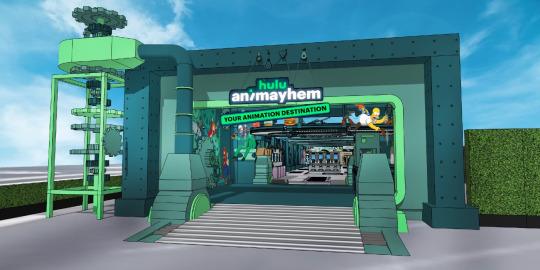
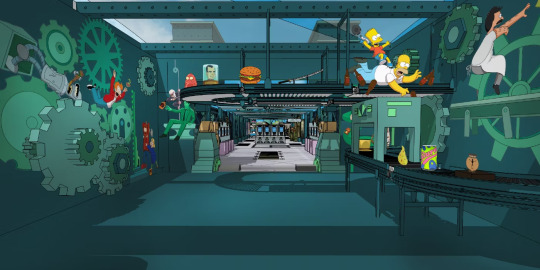
Hulu's Animayhem Returns to SDCC With a Factory of 20th Television Animation
Disney is once again bringing the Hulu Animayhem to San Diego Comic-Con. Last year, the streaming service created a hub for all of its adult animated favorites, from Futurama to Solar Opposites, the Bob's Burgers, and The Simpsons.
This year's activation is designed like a factory with all the characters of your favorite animated shows working to crank out some of the best series the medium has to offer. Mock-ups show a floor filled with references to Animayhem's flagship programs, with Bob Belcher, Homer and Bart Simpson, Fry and Bender, Hit-Monkey and Bryce, and more flying through the gears and conveyer belts that make it all work. Deeper inside the factory is where the real magic lies, however, with a selection of immersive activities based on the shows and exclusive collectible memorabilia that can only be found at the yearly convention
Key among the factory's many moving parts is a replica of Futurama's Slurm Factory. The highly addictive soft drink, which may or may not be made from the slime excreted from the butt of an alien slug queen, is Fry's favorite drink in the year 3000 and the episode "Fry and the Slurm Factory" gives him and the Planet Express crew a once-in-a-lifetime chance to see how it's made. Animayhem's replica recreates the factory as it appeared in the beloved episode, from the Willy Wonka-inspired music to the borderline copyright-infringing Grunka Lunkas and, of course, the Slurm Queen herself for some unique photo opportunities.
Past that is the Cutawayland Storage, a special 25th-anniversary celebration of Family Guy full of all the best cutaway gags from the Seth MacFarlane show's long history. Fans can pick up 2D objects that correspond with specific jokes and take them to viewing stations to see the cutaway play out on the spot. Add in some cutouts of the Griffin family in their signature yellow tuxedos from the show's iconic intro sequence, and the station has no shortage of photo opportunities to commemorate such a major milestone.
Slurm isn’t the only treat fans can see the making of. Another area replicates The Simpsons LardLad Donut Factory where Homer Simpson's favorite pink-sprinkled sweets are made. As part of a partnership with the SoCal staple Randy’s Donuts, attendees can pick up ready-made donuts with suspiciously green icing that may be toxic waste from Mr. Burns's power plant.
From there, the factory opens up with a bevy of interactable activities including a chance to sing along to the end credits songs of Bob's Burgers and get a shareable video from Bob's Record-O-Matic, take a Solar Opposites-themed Goobler stress test and get a corresponding Goobler stress ball based on the results, and search for the Bonsai Master's Sword in a Hit-Monkey-themed katana factory to win an SDCC-exclusive set of pins.
American Dad fans can also come to the rescue of the show's disguise-loving extraterrestrial star, Roger. His cries for help will ring throughout the activation as he's stuck in a CIA lab and being dissected. Following Stan and Francine's example from "The Scarlett Getter," participants will have to quickly reassemble the alien in an Operation-like game, a task easier said than done with his strange organs scattered all over the place. Whether that operation is successful or not, a photo opportunity with Roger's golden turd will be available thereafter
For anyone who needs a quick rest after all the adult animation activity, the Animayhem Factory is stocked with a break room courtesy of three of 20th Television Animation - The Great North. A fridge in the room can be opened for some refreshing cold air during the red-hot summer while also providing a view of the Tobin family's idyllic Alaskan cabin.
Hulu's Animayhem activation opens on July 25 from 11:30 a.m. through 7 p.m., July 26-27 from 9:30 a.m. through 7 p.m. daily, and July 28 from 9:30 a.m. through 5 p.m. Stay tuned here at Collider for all of our coverage of SDCC throughout the weekend. Get an exclusive look at the Animayhem factory in the gallery above.
#The Simpsons#Futurama#Family Guy#American Dad#Bob's Burgers#Solar Opposites#The Great North#Hit-Monkey#Hit Monkey#20th Century Studios#20th Television Animation#Matt Groening#David X Cohen#Loren Bouchard#Nora Smith#Seth McFarlane#Josh Bycel#Mike McMahan#Lizzie Molyneux#Wendy Molyneux#Will Speck#Josh Gordon#San Diego Comic-Con#San Diego Comic-Con 2024#San Diego Comic Con#San Diego Comic Con 2024#SDCC#SDCC 2024
30 notes
·
View notes
Text
The 13th Arshi Anniversary Fiesta
Moodboard : Historical AU
Whispers of the Heart | Chapter 20

DISCLAIMER: The story is set in the early 20th century. While I have made efforts to capture the essence of the era, there may be inaccuracies as this is a work of fantasy. I do not own the characters Arnav and Khushi, and this story is purely fictional with no relation to any real individuals, living or dead. Any resemblance to actual persons or events is purely coincidental.
WARNING: 18+, MATURE CONTENT.



Chapter 20
A silent rage was brewing in Arnav, a storm concealed beneath a veneer of calm. Khushi could tell something was bothering him, but she couldn't pinpoint what it was. Though he had tried to put on a neutral face, she could see it in his eyes, in the set of his jaw.
As soon as they entered the house, he grabbed Khushi by the back of her neck with one hand and twisted her arm behind her back with the other, pulling her close until her body was pressed tightly against his.
Before Khushi could get her bearings she felt his lips descend upon hers in a fierce kiss. His hand moved from her neck into her hair, grabbing a fistful and pulling her head back slightly as they momentarily broke for breath. Arnav trailed open-mouthed kisses of fire down her neck and back up, capturing her lips again before giving her just enough time to breathe.
Having his fill, Arnav broke the kiss and looked at Khushi, their noses almost touching. She noticed his eyes had darkened and her heart began to race, trying to get out of her rib cage. She felt the heat of his rage radiating off him. Her senses were overwhelmed by his harsh breathing against her lips, setting her skin on fire. The desire crackled on the surface of her skin like a live wire. Every nerve ending in her body went on high alert.
His nostrils flared as he spoke through clenched teeth, his voice rougher and huskier than before. The dimness of the hallway seemed to amplify the darkness in his tone even more, "It seems, Mrs. Raizada, I wasn’t clear enough the first time we had this conversation."
"What are you talking about?" Her voice trembled as she whispered into the darkness.
"Let me show you," he said, swiftly tugging at the strings that held her blouse together. The strings snapped, along with the delicate material of the blouse, giving way with a sharp rip. In the process, the pearl necklace she wore that evening, became entangled and broke, sending pearls scattering in every direction, rolling and clattering across the floor. The room was filled with the sound of shattering pearls and their harsh breathing.
A loud gasp escaped her. Before she could react, the rest of her clothes were discarded onto the floor and Arnav had her pinned against the front door with his hands gripping her bottoms. Despite the anger and frustration radiating from him, his touch remained gentle. Khushi instinctively wrapped her arms and legs around him. The cold wood pressed against her back contrasted with the warmth radiating from his body. She looked up at him with eyes filled with a mix of bewilderment and unspoken longing. She felt him pressing his body against her core, still fully clothed, causing an involuntary whimper to escape her lips and her mouth to hang open in a soundless moan.
"Do you feel me?" Her eyes slid shut as her head thudded against the door.
"Look at me, damn it. Answer me," he demanded, emphasizing his point with a forceful thrust of his hip against her. Her eyes flew open as she clutched his neck, nodding her head while biting her lip hard.
"Say it out loud, Khushi." She whimpered at his tone.
"Yes," rapidly bobbing her head, "yes."
"See what you do to me? You drive me mad. Do you have any idea how crazy I am for you?" As Khushi stared at him speechlessly, he continued, "I think you need a demonstration."
He carried her to their bedroom and placed her on the bed. Switching on the bedside lamp, he gazed at her— flushed skin, heaving chest, and hair dishevelled from his touch. How this beautiful creature could feel so insecure was beyond his imagination. And he was angry, but today he would see the end of it.
He took his time removing his clothes one piece at a time, observing her as her eyes followed his every movement. When he hovered over her, she instinctively placed her arms around his shoulders. He pried her fingers away, one at a time, moving them above her head and held them there by her wrists. With a swift, hard thrust, he entered her.
"Oh, God."
"God isn't here, Khushi. Why don't you start calling out to the one who is?" he said through his teeth.
"AAArnav" she stammered.
"Now you’re talking."
Arnav set a punishing rhythm, harder and rougher than usual, making Khushi feel dizzy. Yet his eyes held her captive, daring her to close them. As the familiar warmth spread through her body, she lifted her head to seek his lips, but he moved away. With a deep thrust, he stilled completely, causing her to gasp loudly.
"Let's have a chat."
"Right now?" Khushi said, licking her dry lips.
"Yes, it's a nice time to have a chat, don't you think?" A smug smirk played at the corner of his lips as he continued, "You know, Khushi..." Meanwhile, he withdrew from her warmth in a slow, torturous and controlled movement, letting her feel every bit of him and then sheathed himself back inside completely, rendering her momentarily stunned. "There's a girl I know who makes me feel so out of control....and she is the most beautiful girl in this world. Do you know her?"
"Huh?"
"Do you know her?"
"Arnav, please."
"Please, what?" His lips hovered over hers. He pulled out again and barely pushed his tip in between her swollen nether lips, making her cry out softly, as he breathed out, "What do you need, Khushi?"
"You... I need you," she whimpered.
"You want me?" She eagerly nodded her head as he dipped an inch inside her warmth. His eyes never left hers. "just answer my question and you can have me," he promised against her lips, punctuating every other word with a quick jab inside her.
"I don't know what you want me to say." She raised her pelvis to meet his.
"tsk, tsk, tsk....Wrong answer, Khushi," he said, completely withdrawing from her warmth and leaving Khushi feeling empty inside. Desperation was evident in her glossy eyes as they darted back and forth between his.
"Wait!!" She swallowed hard. "Me, it's me." The smirk on his lips was now full-blown, and she was rewarded with a deep thrust. He set a deep, steady rhythm, not enough to push her over the edge but just enough to keep the fire growing.
"So, are you the most beautiful girl in this world, Khushi?"
"Yes, I am." her breathing was shallow, body covered in a thin sheet of sweat as she tried to bring Arnav closer by tightening her legs around his hips. Securing both of her wrists in one hand, Arnav pulled her legs apart with the other.
"Are you the smartest?"
"Yes, I am," she answered, sensing her torture not being finished yet.
".....and the strongest?"
"Yes."
"Are you the girl I can't live without, Khushi?" his breath shattered, he knew he wouldn't last long.
"Yes, I am the girl you can't live without." her eyes watered as she whispered against his lips.
"and the only girl I love?"
"and the only girl you love."
"Nobody stands a chance."
"Nobody....... ugh....Arnav." She bit her lips, moaning sweetly, begging him with her all-consuming eyes.
"Do I need to drill that into you more, or will you remember it?"
"I'll remember, I'll remember, but please don't stop.... never stop." He couldn't help but chuckle. As soon as he released her hands, she immediately grabbed the back of his head, bringing their lips together and finally making him stop talking and have her moment.
Arnav held the headboard for support, maintaining his previous rhythm to pound her senses out of her body, while Khushi clutched his back, nails digging into his skin. And then he felt it. Her inner walls began to flutter and spasm around him. He watched her as euphoria washed over her face. The flush in her cheeks spreads down her neck and across her chest up to her rosy peaks. It's always magnificent to watch her come undone. It's like watching a fireworks display for the very first time-an explosion of beauty, energy and light.
As the next morning rolled on, London was blanketed by its first snow of the season. The city was transformed into a pristine winter wonderland. The rooftops and trees were all draped in a thick, fluffy layer of white and sparkled in the soft morning light. The air was filled with the crisp scent of snow and the faint echo of holiday carols. The usually bustling streets were now serene, with the snow adding a layer of tranquillity and joy to the holiday season.
"Why didn't you wake me up?" Khushi asked him sleepily, standing in the doorway of the study while Arnav worked on a case.
"You were sleeping so peacefully," he said, looking adoringly at her as she sat sideways on his lap, tucking her head under his chin and snuggling against him. She shivered slightly as the morning chill wind blew through the window.
“Why aren’t you wearing a sweater?” Arnav asked, draping the throw that was lying nearby over her and drawing her closer to the warmth of his body.
They just sat there like that, basking in each other's presence. Arnav placed a soft kiss on her forehead, and a tiny smile appeared at the corners of Khushi's lips. He murmured gently against her skin, “Was I very rough last night? Sorry, I got carried away.”
“It’s okay. I wouldn’t mind you getting carried away once in a while,” she said, drawing a chuckle from him. Then she pouted mourning her damaged jewellery."You broke my pearl necklace."
"I'll buy you another one."
“But why did you get angry? I didn’t get insecure about her last night.” As Arnav raised an eyebrow, she retreated, adding, “Maybe a little bit, but I recovered pretty quickly.”
“You shouldn’t feel like that at all.”
Khushi buried her nose in the soft skin of Arnav’s neck and murmured, nestled in his embrace, “Arnav, what if you get tired of me being so insecure all the time…”
“....guess I have to drill all your insecurities out of you.”
Khushi swatted her shoulders lightly as his whole body shook lightly with laughter.
“You say it as if I haven’t made any mistakes in the past few weeks,” Arnav said, drawing random patterns on her back.
“Like..”
“Like I didn’t tell you about the letter you read.” His eyes hardened a little bit, "... and I shut you out after our fight. I should have talked to you."
Khushi pressed her lips together, forming a thin, hard line.
“Don’t put me on a pedestal, Khushi. We’ll both make mistakes.” As her face fell, Arnav added, “You see it's my first marriage, Mrs. Raizada. Let me learn all the tricks and tips, then I won’t face any problems in my subsequent marriages.” Arnav said teasingly, causing Khushi’s mouth to hang open in disbelief.
“Shut up,” Khushi said exasperatedly, causing Arnav to laugh out loud. He pulled a reluctant, pouty Khushi into a tighter embrace. After a slight objection, Khushi eventually settled into his arms willingly.
"We'll learn together, okay?"
“I like the sound of that, Mr. Raizada.” Arnav leaned down to capture her lips in a sweet kiss, sealing the deal. Then her stomach growled loudly, causing both of them to burst out laughing.
“Let’s feed the monster, Mrs. Raizada.”
@featheredclover @arshifiesta @phuljari
<previous> | <next>
#ipkknd#iss pyaar ko kya naam doon#arnav singh raizada#khushi kumari gupta#arshi#ipk 13th anniversary fiesta#whispers of the heart
28 notes
·
View notes
Text
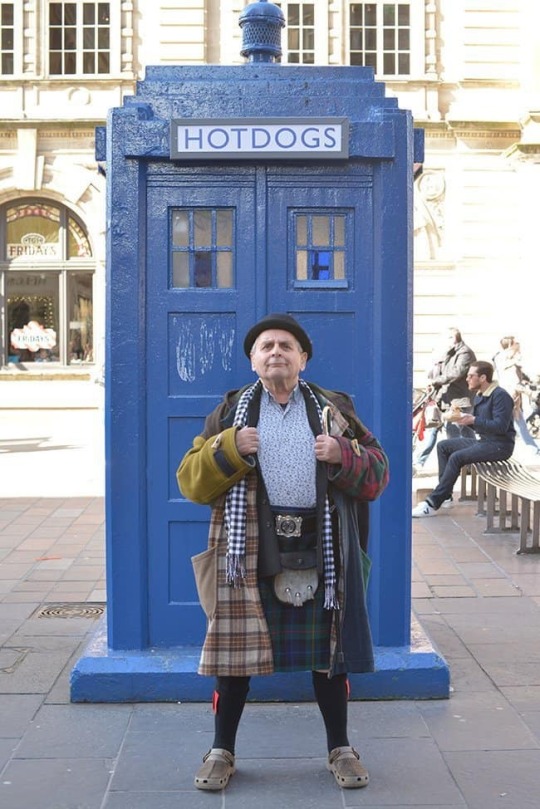

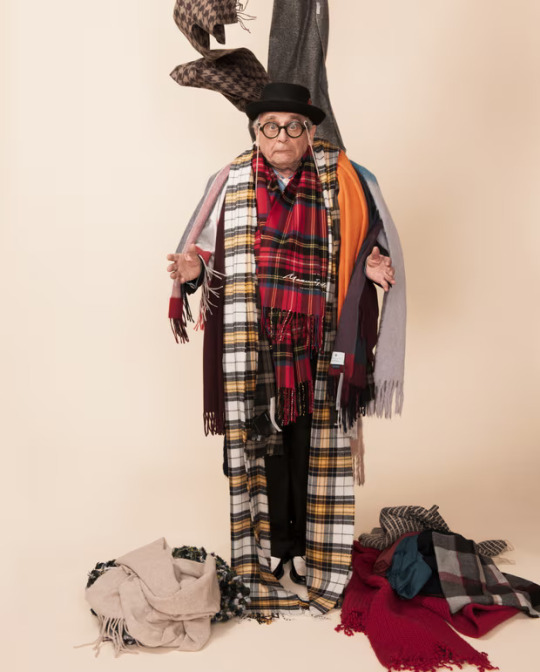
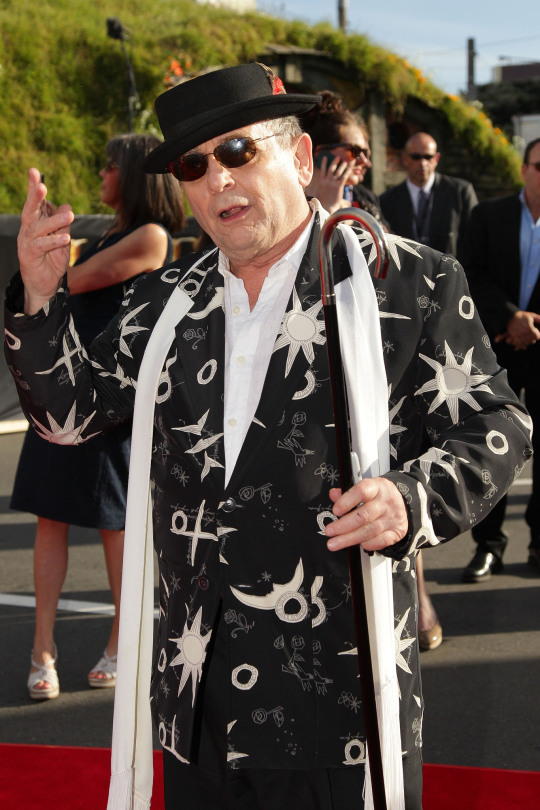
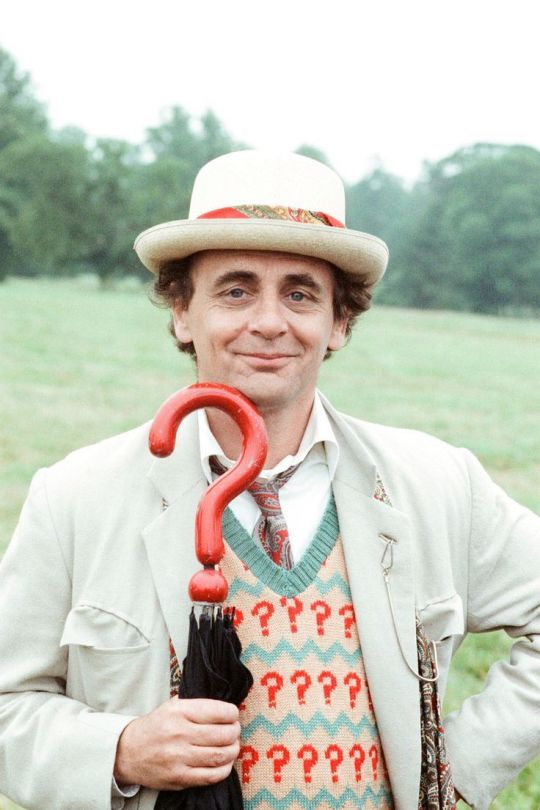

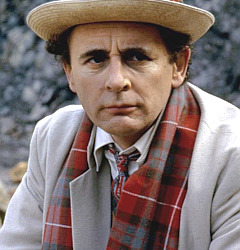
Happy Birthday Percy James Patrick, AKA Scottish actor, Sylvester McCoy who was born 20th August 1943, in Dunoon.
His father was killed in the Second World War a couple of months before he was born, and he was brought up by his mother, his grandmother and aunts.
He attended St. Mun’s, primary School in the town and as Percy Smith he trained as a priest, joining Blair's College, a seminary in Aberdeen, for boys between the ages of twelve and sixteen he then gave it up and applied to become a Monk! This was rejected, as he was too young, so Percy returned to Dunoon and finished his education at Dunoon Grammar School.
On leaving school he took a holiday to the bright lights of London and ended up staying, taking a number of jobs, he sold insurance, acted as a bodyguard for the Rolling Stones, then gained a job selling tickets and keeping the books in a theatre box office. Eventually, he joined the Ken Campbell Roadshow. Along with Bob Hoskins, Jane Wood, and Dave Hill, McCoy started performing a range of sketches with the umbrella theme of “modern myths.”
McCoy found himself for a while in a double-act with Hoskins before Hoskins left to pursue his film career. When working with Ken Campbell in an improvised a circus-based act about a fictitious stuntman called Sylvester McCoy he thought it would be amusing if the program stated that this character was played by "Sylvester McCoy". While at the Royal Court Theatre, one of the critics missed the joke and assumed that Sylvester McCoy was a real person. McCoy liked the irony of this and adopted the name of his stage identity.
His big break came when McCoy was starring at the National Theatre in “The Pied Piper”, a musical play written especially for him, when he learned that the BBC was looking for a new lead actor to replace Colin Baker in “Doctor Who”. He later won the role as the seventh Doctor and the first Scottish one!
Following “Doctor Who,” McCoy continues to work extensively in theatre, films, radio, opera, and on television.He sees himself as an all round entertainer, his talents include,playing the xylophone and the spoons. He can also juggle and once gained a reputation for stuffing live ferrets down his trousers.
McCoy was considered for the role of Bilbo Baggins in The Lord of the Rings Trilogy and must have made a lasting impression on the filmmakers as they were later to cast him as Radagast the Brown in The Hobbit films.
Like many other former Time Lords, Sylvester has televised the role, in 2022 we aw him return in The Power of the Doctor, I assume there is a chance he will crop up in the 60th anniversary specials, although I can't see him being mentioned as yet.
Sylvester is still keeping busy, he is lined up to appear in the BBC drama Father Brown, it will air next year. This year he appeared in the horror film, Necronomicon, it only has two reviews on IMDB, both slating it. The website also notes that he has four more projects in various stages of production.
107 notes
·
View notes
Text
Early production deep-dive - Part 1: The show’s creation
This year marks the 20th anniversary of the show’s premiere, and to celebrate it until April 3rd we’ll have multiple daily posts of cool information we’ve found about the show.
For starters, let’s take a deep dive back to the early 2000s, even before 2004, all the way to 2001 when the show’s idea first came up!
On an interview for the DPOFPA (Danny Phantom Official Forum Picture Archive), Butch Hartman shared the story of how he first came up with the idea: it was February 2001, after hearing that the channel was looking for a boy’s action show and during a drive back to California with his mother, that he brainstormed different names until settling on Danny Phantom, although it almost didn’t go that way:
"Butch Hartman: But it's kind of fun to know he was almost called "Jackie Phantom". Once I had the name I knew it would have to have something to do with ghost fighting or monster hunting. C'mon? "Danny Phantom"? He's not gonna fight bad breath! I was also going to give him a group of super powered teen sidekicks to help him. The entire show was going to be called "Danny Phantom and the Specter Detectors". (Source: https://web.archive.org/web/20080102170004/http://hometown.aol.com/zcat6/IntBH2006p3.html)
Although he contacted a couple people about it, such as Bob Boyle and Steve Marmel, who would later become DP’s art director and DP’s co-writer, respectively, Hartman worked on the development by himself on the first months, letting the idea simmer while trying out different concepts and styles, until settling on an early character design for his main character:


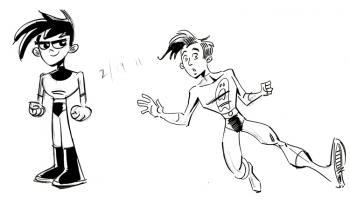
(Source: https://web.archive.org/web/20071029162015/http://frederatorblogs.com/post/3385)
[Image Description: Three images of black and white early concept designs of the character Danny Phantom drawn by Butch Hartman.
Image 1 -Danny in a crouching pose, hovering above the ground. His hair is black and he looks forward slightly to the right with a surprised face. He wears a white jumpsuit with a black collar, along with white gloves and black boots. There’s text underneath: ‘How does he have phantom powers? 2/9/01 Friday’.
Image 2 - Danny standing in a confident pose, hands closed in fists and a smile on his face. His hair is white and his eyebrows are black. He’s wearing a black jumpsuit with his collar, belt, gloves and boots all colored white. The text ‘Danny Phantom’ is written to the right side, next to his legs, and below is Butch’s signature and the date ‘3/01’.
Image 3 - Two Danny designs side by side. The Danny on the left is standing with his hands balled into fists by his sides, and he’s smiling while looking to the right. His hair and eyebrows are black, his jumpsuit and gloves are white, while his boots and collar are black. He also wears a black underwear above his jumpsuit, reminiscent of old superhero costumes.The next design shows Danny in movement, like he’s mid-walk while flying forward. He has a surprised face while looking at the right, one of his hands is closed while the other is open and facing outward. His jumpsuit, gloves, boots and collar are all white, except for his underwear which is black. He has a ghost outlined on his chest as a logo. /end ID]
Previous - Next
#Date: February 2001#Behind the Scenes Artwork: Butch Hartman#Image Description included#DannyPhantomArchive#Danny Phantom#DPA post 04#Content: Pre-premiere
16 notes
·
View notes
Note
hello you dont need to respond to this or anything I just wanted to tell you that I am a minor that ships zadr as same age chars and not everyone who ships em is proship but I am sad so many people who do ARE :( Good on you for setting your boundaries against ships though just maybe lessen the kill yourself part for ALL zadr shippers and just for the proship ones (also if you know a place where zims age has been 100% confirmed and not changed multiple times please share !! genuinely want to know ^^)
how long have you been in this fandom. like genuinely. jhonen has been saying that ZIM is DEFINETLY an adult for 20 years now. he mentions it in the dvd commentary, in interviews, on twitter, on stream. im gonna pull these ones here from this post (which was linked IN MY PINNED POST z*adrs learn how to read challenge), but there are definetely more examples. he has mentioned it in the 20th anniversary stream too.
HMMM I DO WONDER WHY ALL OF THESE PEOPLE ARE PROSHIP. HMMM HOW PECULIAR!!!!!!!!!!!!!!!!!!!!
all of those proship apologetics too lol. "oh hes child coded!" ITS A CRATOON FOR KIDS DUMBASS. of course the main protagonist needs to be relatable to children. sponge bob is child coded too, i dont see a lot of weirdos going around saying hes a child. oh yea there are no child characters to ship him with. hmmmm
"oh but hes an alien he has a different life cycle he could be a child soldier" shut tha hell up you fucking nerd. when has INVADER ZIM as a show been invested in xenoontogeny. hes a short green lazer gun wielding alien that has a military rank and a job. confirmed to be the same age as the tallest in an unfinished episode "the trial". he fights with human children because its FUNNY for a grown ass alien supersoldier to be throwing hands with 12yearolds on the regular.
"errrm actually ZIM is 160 it was confirmed" CONFIRMED WHERE FUCKASS. that is literally a fandom rumor. i have no idea where it started but it was not jv and not anyone whos related to the show. i have a guess that it came from some iz headcanons tumblr that would format their post with overlaying text on top of iz screenshots in the show font but im not sure. i would rather die than be a fandom historian
also if it bothers you so much that i say kill yourself z4drs on my posts you should leave tumblr and grow a spine. just block me you brainlet
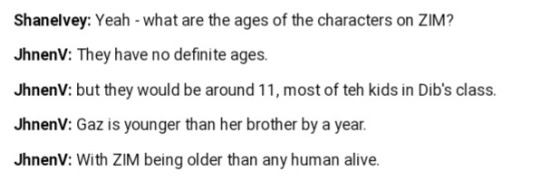

this one is from the megadoomer commentary that is literally ON YOUTUBE

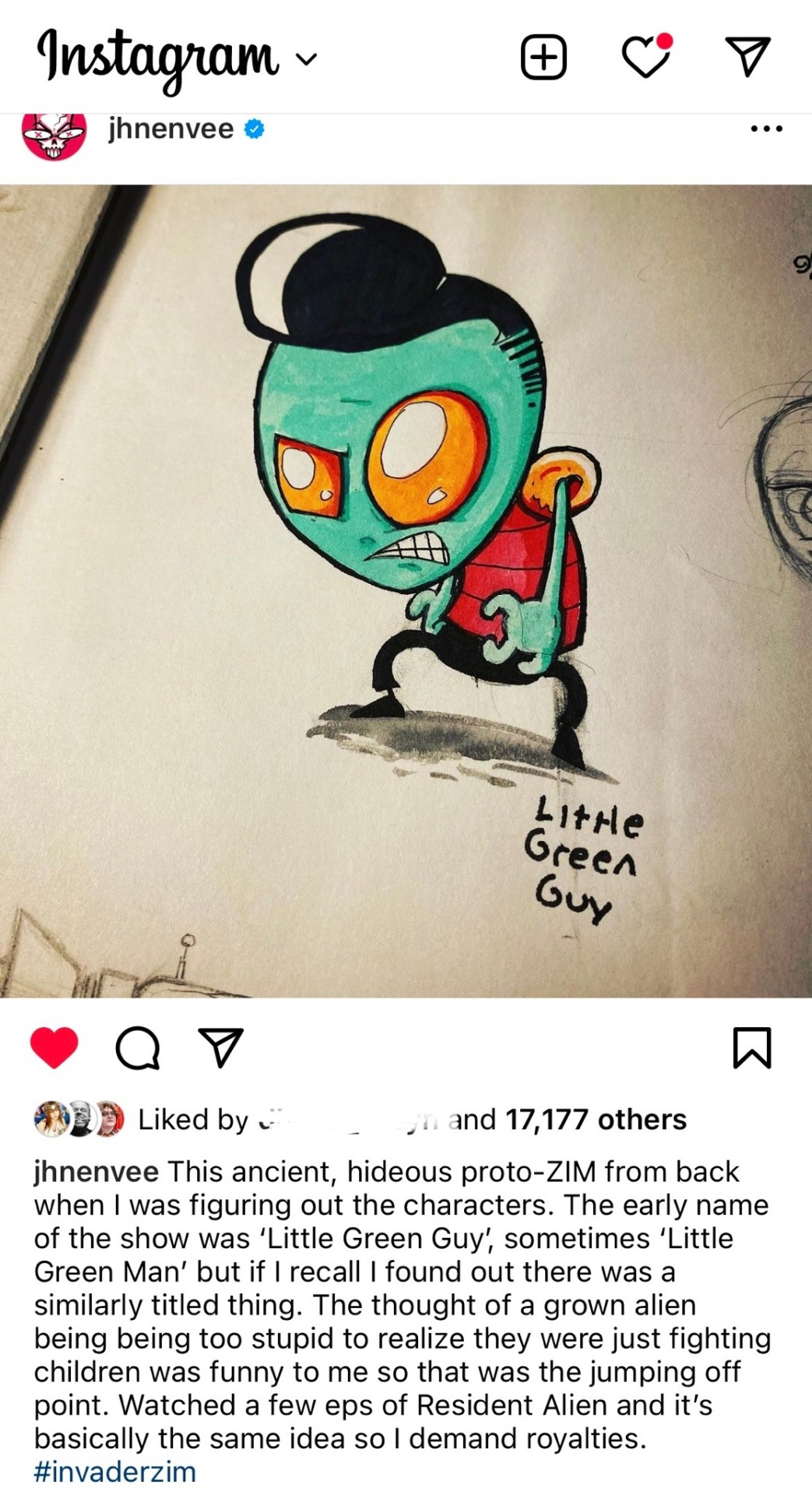

#iz#asks#hashtag YES all z//drs even the ones that claim not to be proship. bc you are a part of the problem#an anon (different one) just pointed out that i should be less harsh on the minor and yes i am sorry for the tone of this post#kind of glossed over that when i was reading the message. my bad#it is the responsability of the adults in the fandom not to spread misinfo and harmful proship rhetoric#however my point still stands. you cant be a z//dr and not proship. zim has always been an adult#invader zim
33 notes
·
View notes
Text
Little Muppet Sesame Things #76
So the Sesame Street 20th anniversary special ended with a great form of credits having everyone singing "Sing".

Ernie and Bert, chillin' together - Jim Henson and Frank Oz

Don Music jamming on his piano with some kids hanging out - Richard Hunt

Luis and Maria with two kids, who need a toy car fixed - Emilio Delgado and Sonia Manzano

Bob serenading us with his amazing voice with Barkley, everyone's favorite Sesame doggo - Bob McGrath and Fred Garbo

Big Bird at his nest - Caroll Spinney

Susan, Gordon, and Miles sitting on the stoop of 123 Sesame - Loretta Long, Roscoe and Miles Orman

Prarie Dawn and Ruby, the ladies of the Muppets - Fran Brill and Camille Bonora

Two kids with the Snuffleupagus siblings, little Alice and big brother Aloysius "Snuffy", Alice being an echo for Snuffy - Judy Sladky and Martin Robinson and Bryant Young

The Children of Sesame Street... a couple dozen kids, plus Maria and Luis

The Original blue man group: Herry Monster, Grover, and Cookie Monster - with David Rudman

Linda signs while Elmo sings happily - Linda Bove and Kevin Clash

Count solos after a countdown - Jerry Nelson

Telly sings while Baby Natasha babbles along - with Pan Arciero

Uncle Wally, Gina, and David with two kids at Hoopers - Bill McCutcheon, Alison Bartlett, and Northern Calloway

The first muppet we ever saw on Sesame...

... and the many friends and family. There are too many characters to even list off, but I love that Ernie and Kermit are close together as are Bert and Grover. You know Jim and Frank are controlling them with one hand each.

And end with a special tribute to Joe Raposo, who passed before the special aired.
I'd recommend this special, but... it's hosted by Bill Cosby.
...yeah...
5 notes
·
View notes